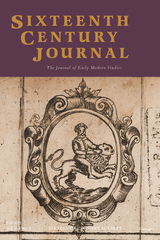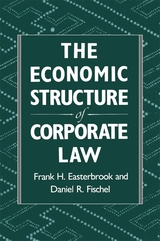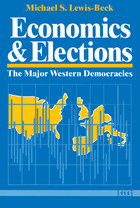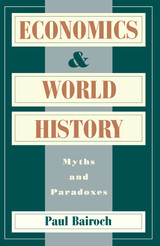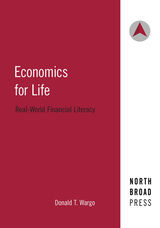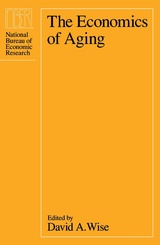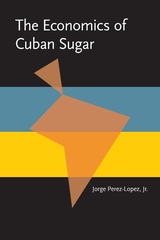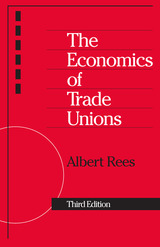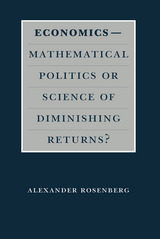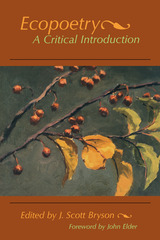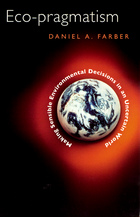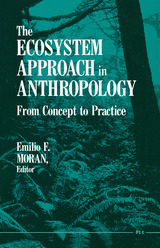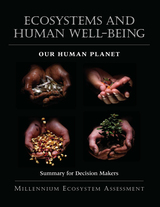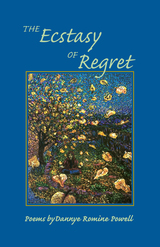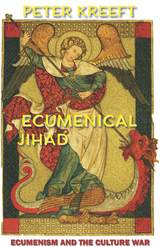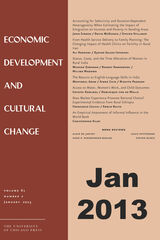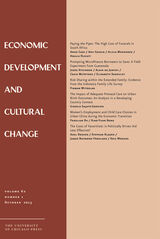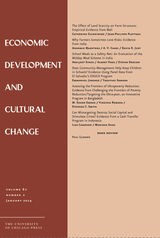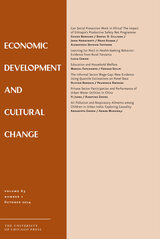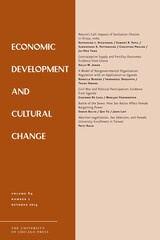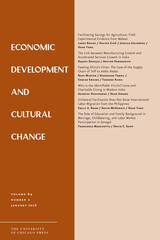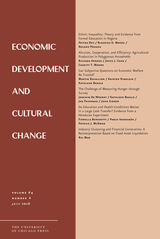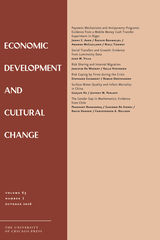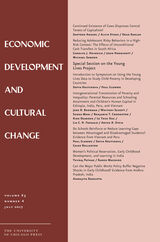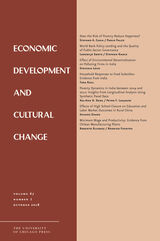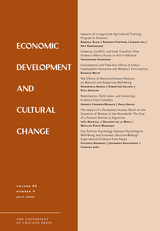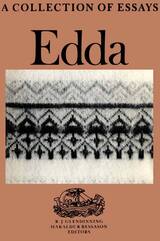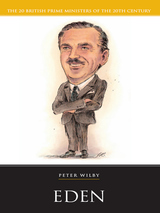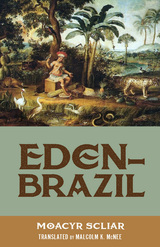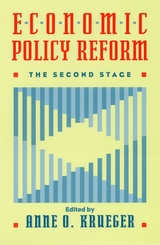 Economic Policy Reform: The Second Stage
Edited by Anne O. Krueger
University of Chicago Press, 2000 In the 1980s, the formerly planned markets of the Soviet Union and Eastern Europe and the developing nations of Latin America and East Asia embarked upon unprecedented efforts to alter their economic regimes. These first-stage reforms involved a major reconceptualization of the principal elements of the economy, private property, and trade. But in the wake of these reforms, the need for second-stage reforms—the implementation of more structural changes—arose; without the development of new regulatory agencies, tax reform initiatives, adjustments to trade policies, and enhancements in education, labor, and telecommunications, the prospects for economic growth engendered during the first-stage reforms might not be realized.
Economic Policy Reform: The Second Stage provides an incisive overview of the context of these crucial second-stage reforms with a thorough examination of the issues confronting the policymakers involved. Edited by Anne O. Krueger, it features studies from distinguished experts in various fields of economics. Each chapter of this book addresses a key issue in economic policy, examines the progress of reforms in the markets considered, and then explores what research might further aid leaders as they embark on fundamental changes.
Both a handbook for economists and practitioners and a theoretical exploration of the most significant challenges currently facing the economic world, this new book will be indispensable to anyone involved in the global economic scene.
Contributors:
Vittorio Corbo
Cimon Cowan
Sebastian Edwards
Stephan Haggard
Michael Kremer
Steven Matusz
Frederic S. Mishkin
Jonathan Morduch
Roger G. Noll
Miguel A. Savastano
T. Paul Shultz
Mary M. Shirley
T.N. Srinivasan
Joseph E. Stiglitz
Vito Tanzi
David Tarr
Aaron Tornell
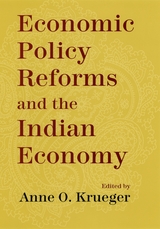 Economic Policy Reforms and the Indian Economy
Edited by Anne O. Krueger
University of Chicago Press, 2002 India is the second most populous country in the world and also one of the poorest. From the late 1940s to 1980, India's per capita income grew at an average annual rate of only two percent. Expansionist economic reforms during the 1980s boosted economic growth but also unfortunately resulted in high inflation and a balance of payments crisis. As a consequence, in 1991 the government announced sweeping new changes in economic policies.
Economic Policy Reforms and the Indian Economy evaluates the effects of those changes and identifies areas of the Indian economy still in urgent need of reform. After an overview of Indian economic policies and development since independence, papers focus on the country's fiscal situation, the environment for private economic activity, education, the reservation of certain activities for small-scale industry, and determinants of differentials in rates of growth across the different Indian states. Contributors include respected academic specialists on India and policy reform, high-level Indian administrators, and present and past policymakers.
 Economic Policymaking in a Conflict Society: The Argentine Case
Richard D. Mallon and Juan V. Sourrouille
Harvard University Press, 1975 Argentina is a fascinating and baffling case to scholars of economic development. It has rich agricultural resources, a fully monetized economy, a domestic manufacturing sector that occupies a large share of the active labor force, a relatively high level of literacy, and other attributes that resemble a European nation more than a developing country. At the same time, Argentina has found it difficult to develop the institutions of a modern nation-state and to sustain a satisfactory rate of economic growth. This book is a new and vigorous attempt to explain the Argentinian paradoxes.
The authors' central hypothesis is that the conventional framework of economic analysis is ill-suited for policymaking in a pluralistic society; in such a society, successful macroeconomic policy management depends on support from viable political coalitions. In the absence of a repressive dictatorship, decision makers in Argentina, the authors maintain, have consistently attempted to adopt policy positions seemingly designed to tear society apart. Does this mean that no mediative policy alternatives exist which are more congenial to political pluralism? The authors present some answers to this important question by examining the Argentine balance of payments and stabilization policies. Their conclusions about macroeconomic policymaking are not only significant for Argentinian policymaking, but are also relevant for other semi-industrial societies.
 Economic Recovery in Gambia: Insights for Adjustment in Sub-Saharan Africa
Malcolm F. McPherson
Harvard University Press, 1995 In the 1980s, world recession, drought, civil conflict, and other forces brought major economic upheaval to the countries of Sub-Saharan Africa. Most of the early efforts by governments to stabilize their economies met with little success, but The Gambia was an exception. In 1985 the government introduced the Economic Recovery Program, one of the most sweeping reform programs attempted on the continent. The economy quickly stabilized, with the rate of inflation falling to below ten percent and the overall balance of payments in surplus for the first time since the early 1970s.
Economic Recovery in The Gambia examines The Gambia's success in depth. It analyzes a wide range of policy reforms-exchange rates, taxation, foreign debt, agriculture, state-owned enterprises, customs inspection-and in each case, the authors review problems the government faced, steps that were taken to address them, and the success and failures of the reform initiatives. These economic and institutional analyses are complemented by an examination of the politics of reform and the role that donor agencies played. The final chapter summarizes important lessons from The Gambia's experience, and provides insights for other countries in Sub-Saharan Africa.
 Economic Redevelopment in Bituminous Coal: The Special Case of Technological Advance in United States Coal Mines, 1930-1960
C. L. Christenson
Harvard University Press The coal industry has undergone a basic revision since World War II—the present picture differs strikingly from the accepted one. Here for the first time the change is studied in detail. This volume defines the relation between changes in coal consumption and the great technological progress in coal mining during recent years. C. L. Christenson begins by inquiring into the uses of coal as part of the supporting base for modern industrial civilization and the relative position of United States reserves as a portion of world supplies. He next examines the specific variations of the reserves which determine the ownership structure of the bituminous coal industry in the United States as well as the 1940–60 product market shift.
Against this background the author reviews the advance of technology, particularly the striking development from 1950–60, and finally he discusses the relation between this development and miners' employment and wages. Christenson surveys the results of investigation of the records of over 3,000 mines in five states, material from the Bureau of Employment Security, and the annual reports of the United Mine Workers of America Welfare Fund from 1950–60.
 Economic Reform in China: Problems and Prospects
James A. Dorn and Wang Xi
University of Chicago Press, 1990 In this volume, distinguished Chinese and Western scholars provide a detailed examination of the problems associated with China's transition to a market-oriented system. A variety of reform proposals, aimed at resolving the contradictions inherent in piecemeal reform, are discussed along with the chances for future liberalization.
These clearly written and insightful essays address the roots of China's crisis. The authors focus on institutional changes necessary for a spontaneous market order and point to the close relation between economic reform and political-constitutional reform. Topics include the speed and degree of the transition, whether ownership reform must precede price reform, how inflation can be avoided, steps to depoliticize economic life, how to create an environment conducive to foreign trade and investment, and how to institute basic constitutional change and open China to the outside world.
The revolutionary changes now shaking the foundations of socialism and central planning in the Soviet Union and Eastern and Central Europe are sure to have an impact on China's future. Despite their seriousness, the events of Tiananmen Square may constitute only a temporary detour on the road toward a private market order. The essays in this volume help lay a rational framework for understanding China's present problems and for discussing the prospects for future reform.
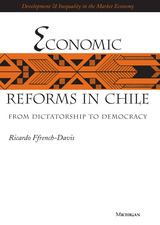 Economic Reforms in Chile: From Dictatorship to Democracy
Ricardo Ffrench-Davis
University of Michigan Press, 2002 Articulate and provocative, Richardo Ffrench-Davis offers the most comprehensive and timely assessment available of Chilean economic reform, from the military dictatorship of Pinochet in the 1970s up to the "reforms of reforms" made by the democratic governments in the 1990s.
Written in accessible and readable prose, Economic Reforms in Chile begins with an overview of the Chilean economy during the last fifty years. This historical time frame is divided into three periods of economic reform. The first period covers the Pinochet regime, during which the more orthodox neoliberalism was implemented. The second period includes the Pinochet dictatorship, during which economic policy shifted toward pragmatism, particularly in the areas of trade and finance; it also includes the crisis of 1982 and its effects. The third period begins in 1990 with the return to democratic elections and the significant reforms to prior reforms. This section also examines the search for growth-with-equity, success in investment and growth performance, macroeconomic sustainability, and the reduction of poverty. Ffrench-Davis addresses several "paradoxes," or results that defy the expectations of policymakers, in order to analyze the significance of comprehensive macroeconomic equilibrium and its implications for sustainable stability, growth, and equity.
Economic Reforms in Chile will be of interest to economists, political scientists, and policymakers involved with the economies of emerging and developing countries.
Ricardo Ffrench-Davis is Principal Regional Advisor, ECLAC, Santiago, and Professor of Economics, University of Chile.
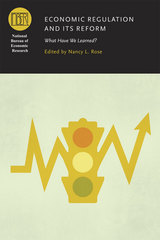 Economic Regulation and Its Reform: What Have We Learned?
Edited by Nancy L. Rose
University of Chicago Press, 2014 The past thirty years have witnessed a transformation of government economic intervention in broad segments of industry throughout the world. Many industries historically subject to economic price and entry controls have been largely deregulated, including natural gas, trucking, airlines, and commercial banking. However, recent concerns about market power in restructured electricity markets, airline industry instability amid chronic financial stress, and the challenges created by the repeal of the Glass-Steagall Act, which allowed commercial banks to participate in investment banking, have led to calls for renewed market intervention.
Economic Regulation and Its Reform collects research by a group of distinguished scholars who explore these and other issues surrounding government economic intervention. Determining the consequences of such intervention requires a careful assessment of the costs and benefits of imperfect regulation. Moreover, government interventions may take a variety of forms, from relatively nonintrusive performance-based regulations to more aggressive antitrust and competition policies and barriers to entry. This volume introduces the key issues surrounding economic regulation, provides an assessment of the economic effects of regulatory reforms over the past three decades, and examines how these insights bear on some of today’s most significant concerns in regulatory policy.
 Economic Response: Comparative Studies in Trade, Finance, and Growth
Charles P. Kindleberger
Harvard University Press, 1978 Charles Kindleberger, an international economic specialist, seeks in this book to show how economic history and economic analysis can interact, giving particular attention to the question of how history can be used in a comparative setting to test economic models for generality. His history and examples span the seventeenth to the twentieth century. The important and unexpected result is to show how the applicable economic model in given instances is strongly conditioned by social, socio-psychological, and political settings in which a given stimulus elicits a particular response. As a by-product, Kindleberger throws light on the political economy of Western European states, especially in international economic dimensions, but also in technological change, scientific education, and economic growth.
In these spirited and lucid essays, Kindleberger discusses related and abiding economic questions: whether the creation of a world financial center is inevitable; what the possible bases for free trade are; how insights can be gained into present day multinational corporations; and how information networks can maximize benefits in trade, and can affect the quality of output, costs, and economies of scale.
Part of the author's interest is methodological. He believes that the comparative method—studying the same rather restricted problem in comparable economies in a fixed regional and temporal setting—yields richer insights than those available from the history of the single economy. While his own studies are limited to merchants, tariffs, free trade, capital markets, and ports, a methodological introductory chapter discusses a wider range of applications.
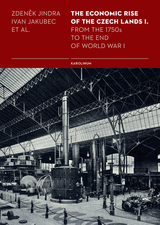 The Economic Rise of the Czech Lands 1: From the 1750s to the End of World War I
Edited by Zdenek Jindra and Ivan Jakubec
Karolinum Press, 2019 This first of a two-part examination of the economic development of the Czech lands deals with the period from the mid-eighteenth century (the accession of Maria Theresa to the Austrian throne) to the end of the World War I. In this key period of industrialization, economic, social, political, legal, and cultural changes intersected. Featuring chapters by leading Czech experts in the economic development and social history of the Czech lands, this broad study explores the multifaceted conditions and outcomes of modernization in Central Europe—from social development to industry, agriculture, banking, transport, and infrastructure—as well as offers valuable comparisons with relevant regions of the Habsburg Empire and Western Europe. Also included are an extensive bibliography and indexes and charts of the Austro-Hungarian monarchy, the scope of the authority of the chambers of trade and industry, the development of leading engineering companies, and various maps, including of the Czech railway network.
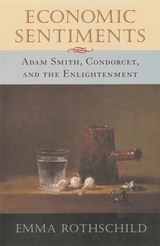 Economic Sentiments: Adam Smith, Condorcet, and the Enlightenment
Emma Rothschild
Harvard University Press, 2001 In a brilliant recreation of the epoch between the 1770s and the 1820s, Emma Rothschild reinterprets the ideas of the great revolutionary political economists to show us the true landscape of economic and political thought in their day, with important consequences for our own. Her work alters the readings of Adam Smith and Condorcet--and of ideas of Enlightenment--that underlie much contemporary political thought.
Economic Sentiments takes up late-eighteenth-century disputes over the political economy of an enlightened, commercial society to show us how the "political" and the "economic" were intricately related to each other and to philosophical reflection. Rothschild examines theories of economic and political sentiments, and the reflection of these theories in the politics of enlightenment. A landmark in the history of economics and of political ideas, her book shows us the origins of laissez-faire economic thought and its relation to political conservatism in an unquiet world. In doing so, it casts a new light on our own times.
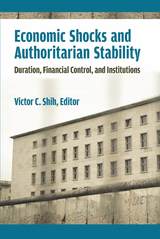 Economic Shocks and Authoritarian Stability: Duration, Financial Control, and Institutions
Victor C. Shih, Editor
University of Michigan Press, 2020 Over two billion people still live under authoritarian rule. Moreover, authoritarian regimes around the world command enormous financial and economic resources, rivaling those controlled by advanced democracies. Yet authoritarian regimes as a whole are facing their greatest challenges in the recent two decades due to rebellions and economic stress. Extended periods of hardship have the potential of introducing instability to regimes because members of the existing ruling coalition suffer welfare losses that force them to consider alternatives, while previously quiescent masses may consider collective uprisings a worthwhile gamble in the face of declining standards of living.
Economic Shocks and Authoritarian Stability homes in on the economic challenges facing authoritarian regimes through a set of comparative case studies that include Iran, Iraq under Saddam Hussein, Malaysia, Indonesia, Jordan, Russia, the Eastern bloc countries, China, and Taiwan—authored by the top experts in these countries. Through these comparative case studies, this volume provides readers with the analytical tools for assessing whether the current round of economic shocks will lead to political instability or even regime change among the world’s autocracies. This volume identifies the duration of economic shocks, the regime’s control over the financial system, and the strength of the ruling party as key variables to explain whether authoritarian regimes would maintain the status quo, adjust their support coalitions, or fall from power after economic shocks.
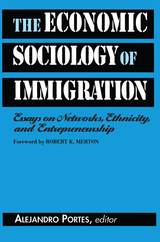 The Economic Sociology of Immigration: Essays on Networks, Ethnicity, and Entrepreneurship
Alejandro Portes
Russell Sage Foundation, 1995 "Portes suggests that immigration constitutes an especially appropriate Mertonian 'strategic research site' for economic sociology in that it provides very good opportunities for investigating the embeddedness of economic relationships in social situations....the contributors expand the conventional domain of economic sociology quite literally in both time and space."—Contemporary Sociology "Alejandro Portes and his splendid band of collaborators make clear that the causes, processes, and consequences of migration vary dramatically from group to group, that a group's history makes a profound difference to its fate in the American economy. They have produced a sinewy book, a book worth arguing with."—Charles Tilly, Columbia University The Economic Sociology of Immigration forges a dynamic link between the theoretical innovations of economic sociology with the latest empirical findings from immigration research, an area of critical concern as the problems of ethnic poverty and inequality become increasingly profound. Alejandro Portes' lucid overview of sociological approaches to economic phenomena provides the framework for six thoughtful, wide-ranging investigations into ethnic and immigrant labor networks and social resources, entrepreneurship, and cultural assimilation. Mark Granovetter illustrates how small businesses built on the bonds of ethnicity and kinship can, under certain conditions, flourish remarkably well. Bryan R. Roberts demonstrates how immigrant groups' expectations of the duration of their stay influence their propensity toward entrepreneurship. Ivan Light and Carolyn Rosenstein chart how specific metropolitan environments have stimulated or impeded entrepreneurial ventures in five ethnic populations. Saskia Sassen provides a revealing analysis of the unexpectedly flexible and vital labor market networks maintained between immigrants and their native countries, while M. Patricia Fernandez Kelly looks specifically at the black inner city to examine how insular cultural values hinder the acquisition of skills and jobs outside the neighborhood. Alejandro Portes also depicts the difference between the attitudes of American-born youths and those of recent immigrants and its effect on the economic success of immigrant children.
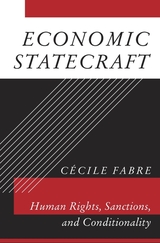 Economic Statecraft: Human Rights, Sanctions, and Conditionality
Cécile Fabre
Harvard University Press, 2018 At least since Athenian trade sanctions helped to spark the Peloponnesian War, economic coercion has been a prominent tool of foreign policy. In the modern era, sovereign states and multilateral institutions have imposed economic sanctions on dictatorial regimes or would-be nuclear powers as an alternative to waging war. They have conditioned offers of aid, loans, and debt relief on recipients’ willingness to implement market and governance reforms. Such methods interfere in freedom of trade and the internal affairs of sovereign states, yet are widely used as a means to advance human rights. But are they morally justifiable?
Cécile Fabre’s Economic Statecraft: Human Rights, Sanctions, and Conditionality provides the first sustained response to that question. For millennia, philosophers have explored the ethics of war, but rarely the ethics of economic carrots and sticks. Yet the issues raised could hardly be more urgent. On what grounds can we justify sanctions, in light of the harms they inflict on civilians? If, as some argue, there is a human right to basic assistance, should donors be allowed to condition the provision of aid on recipients’ willingness to do their bidding?
Drawing on human rights theories, theories of justifiable harm, and examples such as IMF lending practices and international sanctions on Russia and North Korea, Fabre offers a defense of economic statecraft in some of its guises. An empirically attuned work of philosophy, Economic Statecraft lays out a normative framework for an important tool of diplomacy.
The Economic Structure of Corporate Law
Frank Easterbrook and Daniel R. Fischel
Harvard University Press, 1991 The authors argue that the rules and practices of corporate law mimic contractual provisions that parties would reach if they bargained about every contingency at zero cost and flawlessly enforced their agreements. But bargaining and enforcement are costly, and corporate law provides the rules and an enforcement mechanism that govern relations among those who commit their capital to such ventures. The authors work out the reasons for supposing that this is the exclusive function of corporate law and the implications of this perspective.
 The Economic Structure of Intellectual Property Law
William M. Landes and Richard A. Posner
Harvard University Press, 2003 This book takes a fresh look at the most dynamic area of American law today, comprising the fields of copyright, patent, trademark, trade secrecy, publicity rights, and misappropriation. Topics range from copyright in private letters to defensive patenting of business methods, from moral rights in the visual arts to the banking of trademarks, from the impact of the court of patent appeals to the management of Mickey Mouse. The history and political science of intellectual property law, the challenge of digitization, the many statutes and judge-made doctrines, and the interplay with antitrust principles are all examined. The treatment is both positive (oriented toward understanding the law as it is) and normative (oriented to the reform of the law).
Previous analyses have tended to overlook the paradox that expanding intellectual property rights can effectively reduce the amount of new intellectual property by raising the creators' input costs. Those analyses have also failed to integrate the fields of intellectual property law. They have failed as well to integrate intellectual property law with the law of physical property, overlooking the many economic and legal-doctrinal parallels.
This book demonstrates the fundamental economic rationality of intellectual property law, but is sympathetic to critics who believe that in recent decades Congress and the courts have gone too far in the creation and protection of intellectual property rights.
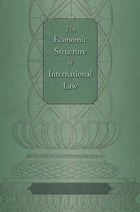 The Economic Structure of International Law
Joel P. Trachtman
Harvard University Press, 2008 The Economic Structure of International Law presents a rationalist analysis of the structure of international law. It employs social scientific techniques to develop an understanding of the role of law in international society. In doing so, it delves into the question of compliance and reveals the real-world circumstances under which states might adhere to or violate international law.
Joel P. Trachtman explores such topics as treaty-making and jurisdiction; the rise, stability, and efficiency of custom; the establishment of international organizations; and the structure and role of international legal dispute settlement. At the core of the book lies the question of the allocation of legal power to states. The Economic Structure of International Law presents policymakers and scholars with an over-arching analytical model of international law, one that demonstrates the potential of international law, but also explains how policymakers should choose among different international legal structures.
Economic Structure of the Yüan Dynasty: Translation of Chapters 93 and 94 of the Yüan shih
Herbert Franz Schurmann
Harvard University Press The author has provided the first step in the field of the economic history of the Yüan, which is one of the most complex in all of Chinese history. Herbert Franz Schurmann has made a thorough analysis, section by section, of the economic part of the Dynastic History. He has used the parts of the Chinese source entitled “land tenure,” “agriculture and sericulture,” “land and head taxes,” “household taxes,” etc. This work will be of great value to historians and economists.
 The Economic Structure of Tort Law
William M. Landes and Richard A. Posner
Harvard University Press, 1987 Written by a lawyer and an economist, this is the first full-length economic study of tort law--the body of law that governs liability for accidents and for intentional wrongs such as battery and defamation. Landes and Posner propose that tort law is best understood as a system for achieving an efficient allocation of resources to safety--that, on the whole, rules and doctrines of tort law encourage the optimal investment in safety by potential injurers and potential victims.
The book contains both a comprehensive description of the major doctrines of tort law and a series of formal economic models used to explore the economic properties of these doctrines. All the formal models are translated into simple commonsense terms so that the "math less" reader can follow the text without difficulty; legal jargon is also avoided, for the sake of economists and other readers not trained in the law.
Although the primary focus is on explaining existing doctrines rather than on exploring their implementation by juries, insurance adjusters, and other "real world" actors, the book has obvious pertinence to the ongoing controversies over damage awards, insurance rates and availability, and reform of tort law-in fact it is an essential prerequisite to sound reform. Among other timely topics, the authors discuss punitive damage awards in products liability cases, the evolution of products liability law, and the problem of liability for "mass disaster" torts, such as might be produced by a nuclear accident. More generally, this book is an important contribution to the "law and economics" movement, the most exciting and controversial development in modern legal education and scholarship, and will become an obligatory reference for all who are concerned with the study of tort law.
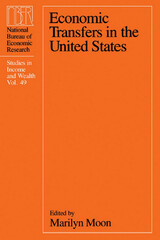 Economic Transfers in the United States
Edited by Marilyn Moon
University of Chicago Press, 1984 In recent years the definition of an economic transfer—a payment to an individual or institution that does not arise out of current productive activity—has been subject to even wider interpretation. This volume addresses that trend and introduces new methods of measuring transfers in the American economy.
Social security, private pension benefits, housing, and health care are traditional kinds of transfers. Accurate measurements of the degree and effect of these and of other, newly interpreted transfers are vital to economic policy making. Though this volume is not directly concerned with policy-making issues, it does impinge on many areas of current public concern; methods of transfer valuation, for example, may affect how we view the status of the aged.
Researchers, policy analysts, and those who compile statistics on which social programs are based on will value the diverse approaches of these ten papers and their accompanying comments. Taken together the essays give great insight into the complexities of defining transfers and provide a wealth of new analytic methods. They were developed from material presented at the Income and Wealth Conference on Social Accounting for Transfers held at Madison, Wisconsin, in 1982.
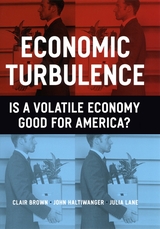 Economic Turbulence: Is a Volatile Economy Good for America?
Clair Brown, John Haltiwanger, and Julia Lane
University of Chicago Press, 2006 Every day, in every sector of our economy, a business shuts down while another starts up, jobs are created while others are cut, and workers are hired while others are laid off. This constant flux, or turbulence, is a defining characteristic of our free market system, yet it mostly inspires angst about unemployment, loss of earnings, and the overall competitiveness of corporations. But is this endless cycle of fluctuation really so bad for America? Might something positive be going on in the economy as a result of it?
In this penetrating work, three esteemed economists seek to answer these questions by exploring the real impact of volatility on American workers and businesses alike. According to the authors, while any number of events--shifts in consumer demand, changes in technology, mergers and acquisitions, or increased competition--can contribute to economic turbulence, our economy as a whole is, by and large, stronger for it, because these processes of creation and destruction make it more flexible and adaptable. The authors also acknowledge and document the adverse consequences of this turbulence on different groups of workers and firms and discuss the resulting policy challenges. Basing their argument on an up-close look into the dealings and practices of five key industries—financial services, retail food services, trucking, semiconductors, and software—the authors demonstrate the positive effects of turbulence on career paths, employee earnings, and firm performance.
The first substantial attempt to disentangle and make clear the complexities of this phenomenon in the United States, Economic Turbulence will be viewed as a major achievement and the centerpiece of any discussion on the subject for years to come.
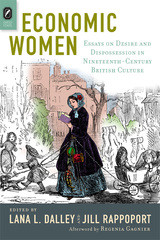 Economic Women: Essays on Desire and Dispossession in Nineteenth-Century British Culture
Edited by Lana L. Dalley and Jill Rappoport
Ohio State University Press, 2013 Economic Women: Essays on Desire and Dispossession in Nineteenth-Century British Culture, edited by Lana L. Dalley and Jill Rappoport, showcases the wide-ranging economic activities and relationships of real and fictional women in nineteenth-century British culture. This volume’s essays chronicle the triumphs and setbacks of women who developed, described, contested, and exploited new approaches to economic thought and action. In their various roles as domestic employees, activists fighting for free trade, theorists developing statistical models, and individuals considering the cost of marriage and its dissolution, the women discussed here were givers and takers, producers and consumers. Bringing together leading and emerging voices in the field, this collection builds on the wealth of interdisciplinary economic criticism published in the last twenty years, but it also challenges traditional understandings of economic subjectivity by emphasizing both private and public records and refusing to identify a single female corollary to Economic Man. The scholars presented here recover game-changing stories of women’s economic engagement from diaries, letters, ledgers, fiction, periodicals, and travel writing to reveal a nuanced portrait of Economic Women. Offering new readings of works by George Eliot, Bram Stoker, Willkie Collins, Charlotte Riddell, and Ellen Wood, and addressing political economy, consumerism, and business developments alongside the ethics of exchange and family finances, Economic Women tells a story of ambivalence as well as achievement, failure as well as forward motion.
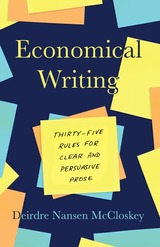 Economical Writing, Third Edition: Thirty-Five Rules for Clear and Persuasive Prose
Deirdre Nansen McCloskey
University of Chicago Press, 2019 "The book every entrepreneur should read. . . . Better than Strunk and White. . . . The work of a master."--Stephen Kinsella, University of Limerick
Economics is not a field that is known for good writing. Charts, yes. Sparkling prose, no.
Except, that is, when it comes to Deirdre Nansen McCloskey. Her conversational and witty yet always clear style is a hallmark of her classic works of economic history, enlivening the dismal science and engaging readers well beyond the discipline. And now she’s here to share the secrets of how it’s done.
Economical Writing is itself economical: a collection of thirty-five pithy rules for making your writing clear, concise, and effective. Proceeding from big-picture ideas to concrete strategies for improvement at the level of the paragraph, sentence, or word, McCloskey shows us that good writing, after all, is not just a matter of taste—it’s a product of adept intuition and a rigorous revision process. Debunking stale rules, warning us that “footnotes are nests for pedants,” and offering an arsenal of readily applicable tools and methods, she shows writers of all levels of experience how to rethink the way they approach their work, and gives them the knowledge to turn mediocre prose into magic.
At once efficient and digestible, hilarious and provocative, Economical Writing lives up to its promise. With McCloskey as our guide, it’s impossible not to see how any piece of writing—on economics or any other subject—can be a pleasure to read.
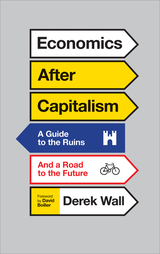 Economics After Capitalism: A Guide to the Ruins and a Road to the Future
Derek Wall
Pluto Press, 2015 'There is no alternative' has been the unofficial mantra of the neoliberal order since its utterance by Margaret Thatcher in the 1980s. However, there is an alternative to our crisis-ridden, austerity-inflicted world - and not just one alternative, but many.
Challenging the arguments for markets, mainstream economics and capitalism from Adam Smith onwards, Economics After Capitalism provides a step-by-step guide to various writers, movements and schools of thought, critical of neoliberal globalisation. These range from Keynesian-inspired reformists such as Geroge Soros and Joseph Stiglitz, critics of inequality like Thomas Piketty and Amaitya Sen, to more radical voices including Naomi Klein, Marxists such as David Harvey, anarchists, and autonomists including Toni Negri and Michael Hardt.
By providing a clear and accessible guide to the economics of anti-capitalism, Derek Wall successfully demonstrates that an open source eco-socialist alternative to rampant climate change, elite rule and financial chaos is not just necessary, but possible.
Economics and Elections: The Major Western Democracies
Michael S. Lewis-Beck
University of Michigan Press, 1990 Does a government’s fate at the ballot box hinge on the state of the economy? Is it inflation, unemployment, or income that makes the difference? What triggers economic voting for or against the incumbent – do voters look at their pocketbooks, or at the national accounts? Do economic voters “punish” rulers for bad times, but fail to “reward” them for the good times? Are voter’s judgments based on past economic performance or future policy promises? These are some of the questions considered by Michael Lewis-Beck in this major cross-national study of the effect of economic conditions on voting behavior in the Western European democracies and the United States.
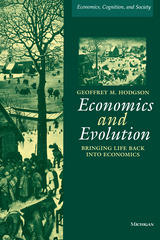 Economics and Evolution: Bringing Life Back into Economics
Geoffrey M. Hodgson
University of Michigan Press, 1996
Economic theory is currently at a crossroads, where many leading mainstream economists are calling for a more realistic and practical orientation for economic science. Indeed, many are suggesting that economics should be reconstructed on evolutionary lines.
This book is about the application to economics of evolutionary ideas from biology. It is not about selfish genes or determination of our behavior by genetic code. The idea that evolution supports a laissez-faire policy is rebutted. The conception of evolution as progress toward greater perfection, along with the competitive individualism sometimes inferred from the notion of the "survival of the fittest," is found to be problematic. Hodgson explores the ambiguities inherent in biology and the problems involved in applying ideas of past economic thinkers--including Malthus, Smith, Marx, Marshall, Veblen, Schumpeter, and Hayek--and argues that the new evolutionary economics can learn much from the many differing conceptions of economic evolution.
"This is a work of enormous perceptivity and subtlety as well as judiciousness of interpretation and critique . . . [that] establish[es] Hodgson as the leading institutional theorist, and as one of the leading evolutionary theorists, of his generation." --Warren J. Samuels
"A daring and successful attempt to expunge the monopoly of reductionist and mechanistic thinking over evolutionary theory . . . a must for anyone who is interested not only in the foundations of economics, but also in the foundations of social theory." --Elias L. Khalil, Ohio State University
Geoffrey M. Hodgson is University Lecturer in Economics, Judge Institute for Management Studies, University of Cambridge.
 Economics and Liberalism: Collected Papers
Overton H. Taylor
Harvard University Press The work of Overton H. Taylor is here made available within the covers of a single volume. More than twenty years of study and reflection have taken shape in the previously scattered short writings, which, chronologically presented, amount almost to intellectual autobiography.
Taylor is not simply an “economist” in the present-day meaning of the term. He is a political philosopher and a political economist—a scholar whose interests extend beyond economics into the surrounding areas of social science, philosophy, ethics, political thought, and intellectual history. Taylor’s search into the basic questions of social science has led him repeatedly—as the papers show—to new and fresh appraisals.
The writings here collected cover a wide range of subjects. Some of them are concerned with large segments of the general history of ideas in Western civilization. Other are extended, critical reviews of the books or the thoughts of contemporary thinkers such as R. H. Tawney, A. G. B. Fisher, and Joseph Schumpeter. Still others discuss modern problems of social philosophy and public policy. In all of them, the reader will find a creative and thought-provoking investigation of the foundations of the liberal conservative position.
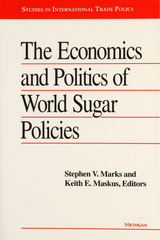 Economics and Politics of World Sugar Policies
Stephen V. Marks and Keith E. Maskus, Editors
University of Michigan Press, 1993 Around the world, markets for producing and consuming sugar and related sweeteners are heavily distorted by trade barriers, output controls, price supports, and government subsidies. These policies have significant and identifiable impacts on the economic well-being of different groups in various countries. The net effect of these global distortions is to damage world welfare at the same time that the various national policies reduce economic well-being in the countries that impose them. Sugar policy is the perfect example of how the political imperatives of support for agricultural interests dominate considerations of national welfare or international relations. The contributors provide rigorous analyses of world sugar markets and the distortions caused by policies tn the major countries. They employ several numerical modeling techniques to describe and assess the impacts of world sugar programs. These calculations are buttressed by complementary discussions of the political and economic rationales underlying sugar protection and support. The contributions to The Economics and Politics of World Sugar Policies combine survey evidence with new modeling results from econometric approaches and applied equilibrium simulations to provide new assessments of the current state of world sugar markets. Several original results are presented that shed new light on the impacts of sugar protection. This book should be of considerable interest to agricultural economists, trade-policy analysts, and specialists in international relations and development economics. It is highly relevant for understanding both the economics of agricultural protection and the politics of farm support.
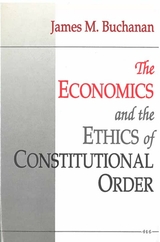 The Economics and the Ethics of Constitutional Order
James M. Buchanan
University of Michigan Press, 1991 How do persons live together in peace, prosperity, liberty, and justice? This ancient question requires continuing analysis, discussion, and attention – by economists, by philosophers, by political leaders, and by members of the body politic. Buchanan’s interests have always centered on the issues relevant to this question, and his most recent essays reflect a new broadening of perspective.
In this collection of twenty distinctly but closely related essays, written over the period 1986-89 following the author’s receipt of the Nobel Prize in Economic Science, Professor Buchanan records his increasing interest in and developing ideas on the constitutional order of a free society, especially in its ethical foundations. The essays in this collection extend beyond the boundaries of economics into moral philosophy, political philosophy, methodology, and epistemology Many of the separate essays were initially delivered by special invitation as lectures to general audiences throughout the world.
The linking theme of the essays in The Economics and the Ethics of Constitutional Order is the continuing relevance of Adam Smith’s ideas to issues emerging in the 1990s – issues that have gained a new immediacy since the revolutionary events of 1989. How can societies organize their economies so as to produce goods and services efficiently while at the same time allowing individuals the liberties to make their own choices? Buchanan’s contributions here are directly addressed to this question.
Economics and World History: Myths and Paradoxes
Paul Bairoch
University of Chicago Press, 1993 A bracing, no-holds-barred debunking of mistaken views of global economics
In Economics and World History, Paul Bairoch clearly and succinctly debunks a number of commonly held beliefs about economic history and the causes and consequences of important events around the world. Taking on twenty commonly held misconceptions, including that free trade and population growth have historically led to periods of economic growth; that a move away from free trade caused the Great Depression; and that colonial powers in the nineteenth and early twentieth centuries became rich through the exploitation of the Third World, Bairoch shows in each case where the mistaken belief originated and why deeper knowledge of economics shows it to b wrong. The resulting book is a treasury for free thinkers, a book that will simultaneously clear up mistakes and help readers avoid making new ones.
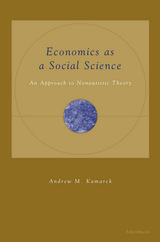 Economics as a Social Science: An Approach to Nonautistic Theory
Andrew M. Kamarck
University of Michigan Press, 2002 Economics as a Social Science is a highly readable critique of economic theory, based on a wide range of research, that endeavors to restore economics to its proper role as a social science. Contrary to conventional economic theory, which assumes that people have no free will, this book instead bases economics on the realistic assumption that human beings can choose; that we are complex beings affected by emotion, custom, habit, and reason; and that our behavior varies with circumstances and times. It embraces the findings of history, psychology, and other social sciences and the insights from great literature on human behavior as opposed to the rigidity set by mathematical axioms that define how economics is understood and practiced today.
Andrew M. Kamarck demonstrates that only rough accuracy is attainable in economic measurement, and that understanding an economy requires knowledge from other disciplines. The canonical hypotheses of economics (perfect rationality, self-interest, equilibrium) are shown to be inadequate (and in the case of "equilibrium" to be counterproductive to understanding the forces that dominate the economy), and more satisfactory assumptions provided. The market is shown to work imperfectly and to require appropriate institutions to perform its function reasonably well. Further, Kamarck argues that self-interest does not always lead to helping the general interest.
Economics as a Social Science examines and revises the fundamental assumptions of economics. Because it avoids jargon and explains terms carefully, it will be of interest to economics majors as well as to graduate students of economics and other social sciences, and social scientists working in government and the private sector.
Andrew M. Kamarck is former Director, Economic Development Institute, the World Bank.
Economics for Everyone, Second Edition: A Short Guide to the Economics of Capitalism
Jim Stanford
Pluto Press, 2015 Economics is too important to be left to the economists. This book provides the information you need to understand how capitalism works (and how it doesn't).
Through clear bite-sized chapters interspersed with illuminating illustrations, this is an antidote to the abstract and ideological way that economics is normally taught and reported on in in media. Key concepts such as finance, competition and wages are explored, and their importance to everyday life is revealed. It answers questions such as 'Do workers need capitalists?', 'Why does capitalism harm the environment?', and 'What really happens on the stock market?'.
The book is supported with a comprehensive set of web-based course materials including videos for popular economics courses.
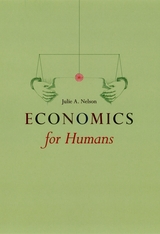 Economics for Humans
Julie A. Nelson
University of Chicago Press, 2006
At its core, an economy is about providing goods and services for human well-being. But many economists and critics preach that an economy is something far different: a cold and heartless system that operates outside of human control. In this impassioned and perceptive work, Julie A. Nelson asks a compelling question: If our economic world is something that we as humans create, aren’t ethics and human relationships—dimensions of a full and rich life—intrinsically part of the picture? Is it possible to take this thing we call economics and give it a body and a soul?
Economics for Humans argues against the well-ingrained notion that economics is immune to moral values and distant from human relationships. Here, Nelson locates the impediment to envisioning a more considerate economic world in an assumption that is shared by both neoliberals and the political left. Despite their seemingly insurmountable differences, Nelson notes that they both make use of the metaphor, first proposed by Adam Smith, that the economy is a machine. This pervasive idea, Nelson argues, has blinded us to the qualities that make us work and care for one another—qualities that also make businesses thrive and markets grow. We can wed our interest in money with our justifiable concerns about ethics and social well-being. And we can do so if we recognize that an economy is not a machine, but a living, beating heart that circulates blood to all parts of the body while also serving as an emblem of compassion and care.
Nothing less than a manifesto, Economics for Humans will both invigorate and inspire readers to reshape the way they view the economy, its possibilities, and their place within it.
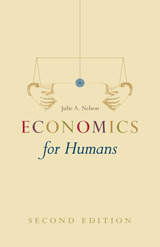 Economics for Humans, Second Edition
Julie A. Nelson
University of Chicago Press, 2018 At its core, an economy is about providing goods and services for human well-being. But many economists and critics preach that an economy is something far different: a cold and heartless system that operates outside of human control. In this impassioned and perceptive work, Julie A. Nelson asks a compelling question: given that our economic world is something that we as humans create, aren’t ethics and human relationships—dimensions of a full and rich life—intrinsically part of the picture?
Economics for Humans argues against the well-ingrained notion that economics is immune to moral values and distant from human relationships. Here, Nelson locates the impediment to a more considerate economic world in an assumption that is shared by both neoliberals and the political left. Despite their seemingly insurmountable differences, both make use of the metaphor, first proposed by Adam Smith, that the economy is a machine. This pervasive idea, Nelson argues, has blinded us to the qualities that make us work and care for one another—qualities that also make businesses thrive and markets grow. We can wed our interest in money with our justifiable concerns about ethics and social well-being. And we can do so if we recognize that an economy is not a machine, but a living thing in need of attention and careful tending.
This second edition has been updated and refined throughout, with expanded discussions of many topics and a new chapter that investigates the apparent conflict between economic well-being and ecological sustainability. Further developing the main points of the first edition, Economics for Humans will continue to both invigorate and inspire readers to reshape the way they view the economy, its possibilities, and their place within it.
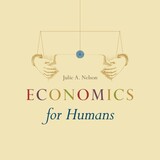 Economics for Humans, Second Edition
Julie A. Nelson
University of Chicago Press, 2018 This is an auto-narrated audiobook edition of this book.
At its core, an economy is about providing goods and services for human well-being. But many economists and critics preach that an economy is something far different: a cold and heartless system that operates outside of human control. In this impassioned and perceptive work, Julie A. Nelson asks a compelling question: given that our economic world is something that we as humans create, aren’t ethics and human relationships—dimensions of a full and rich life—intrinsically part of the picture?
Economics for Humans argues against the well-ingrained notion that economics is immune to moral values and distant from human relationships. Here, Nelson locates the impediment to a more considerate economic world in an assumption that is shared by both neoliberals and the political left. Despite their seemingly insurmountable differences, both make use of the metaphor, first proposed by Adam Smith, that the economy is a machine. This pervasive idea, Nelson argues, has blinded us to the qualities that make us work and care for one another—qualities that also make businesses thrive and markets grow. We can wed our interest in money with our justifiable concerns about ethics and social well-being. And we can do so if we recognize that an economy is not a machine, but a living thing in need of attention and careful tending.
This second edition has been updated and refined throughout, with expanded discussions of many topics and a new chapter that investigates the apparent conflict between economic well-being and ecological sustainability. Further developing the main points of the first edition, Economics for Humans will continue to both invigorate and inspire readers to reshape the way they view the economy, its possibilities, and their place within it.
Economics for Life: Real-World Financial Literacy
Donald T. Wargo
Temple University Press, 2023 America has evolved into an ownership society. Home-buying decisions, resource allocation, debt exposure, and financial planning for the future are now left to individuals who may be poorly equipped to handle them. Economics, with its insistence on quantifying ideas and putting specific quantitative values on all manner of phenomena, can help. Economics for Life: Real-World Financial Literacy is designed to help soon-to-be college graduates emerge into the start of their "real lives" with better comprehension of how to analyze the financial decisions that they will soon have to make. Written in an easy-to-read, conversational style, it will help readers make decisions on saving and investing for retirement, buying a car, buying a home, as well as how to safely navigate the use of debt and credit cards.
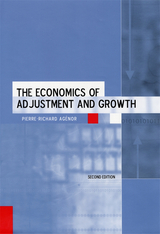 The Economics of Adjustment and Growth: Second Edition
Pierre-Richard Agénor
Harvard University Press, 2004 This book provides a systematic and coherent framework for understanding the interactions between the micro and macro dimensions of economic adjustment policies; that is, it explores short-run macroeconomic management and structural adjustment policies aimed at promoting economic growth. It emphasizes the importance of structural microeconomic characteristics in the transmission of policy shocks and the response of the economy to adjustment policies. It has particular relevance to the economics of developing countries.
The book is directed to economists interested in an overview of the economics of reform; economists in international organizations, such as the UN, the IMF, and the World Bank, dealing with development; and economists in developing countries. It is also a text for advanced undergraduate students pursuing a degree in economic policy and management and students in political science and public policy.
The Economics of Aging
Edited by David A. Wise
University of Chicago Press, 1988 The Economics of Aging presents results from an ongoing National Bureau of Economic Research project. Contributors consider the housing mobility and living arrangements of the elderly, their labor force participation and retirement, the economics of their health care, and their financial status. The goal of the research is to further our understanding both of the factors that determine the well-being of the elderly and of the consequences that follow from an increasingly older population with longer individual life spans. Each paper is accompanied by critical commentary.
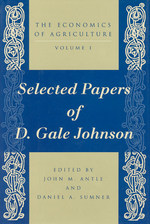 The Economics of Agriculture, Volume 1: Selected Papers of D. Gale Johnson
Edited by John M. Antle and Daniel A. Sumner
University of Chicago Press, 1995 D. Gale Johnson, one of the world's foremost agricultural economists, has over the last five decades changed the conduct of research on agricultural economics and policy. The papers brought together in The Economics of Agriculture reveal the breadth and depth of his influence on the creation of modern agricultural economics.
Volume 1 collects for the first time in one source Johnson's most important work. These classic papers explore the consequences of government intervention in United States and world agriculture; the economics of agricultural supply and of rural labor and human capital issues; and the analysis of agricultural productivity in poor countries, including the centrally planned economies of China and Eastern Europe. Models of precise reasoning and powerful empirical research, the papers cover a wide range of topics—from U.S. commodity price policy to the economics of population control and farm policy reform in China. Volume 1 includes a definitive bibliography of Johnson's published writings.
Volume 2 presents twenty-two papers by Johnson's former students and colleagues. International in scope, these papers explore themes and topics inspired by Johnson's work, including agricultural policy and U.S. farm prices; European Common Agricultural Policy; and agricultural and rural development in the Third World. Contributors to Volume 2 are David G. Abler, John M. Antle, Richard R. Barichello, Andrew P. Barkley, Karen Brooks, David S. Bullock, Robert E. Evenson, B. Delworth Gardner, Bruce L. Gardner, Dale M. Hoover, Wallace E. Huffman, Paul R. Johnson, Yoav Kislev, Justin Yifu Lin, Yair Mundlak, John Nash, Keijuro Otsuka, Willis Peterson, Todd E. Petzel, Vernon W. Ruttan, Maurice Schiff, G. Edward Schuh, Theodore W. Schultz, James Snyder, Vasant Sukhatme, Daniel A. Sumner, Vinod Thomas, George Tolley, and Alberto Valdes.
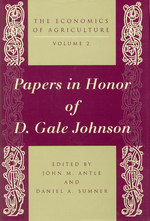 The Economics of Agriculture, Volume 2: Papers in Honor of D. Gale Johnson
Edited by John M. Antle and Daniel A. Sumner
University of Chicago Press, 1995 D. Gale Johnson, one of the world's foremost agricultural economists, has over the last five decades changed the conduct of research on agricultural economics and policy. The papers brought together in The Economics of Agriculture reveal the breadth and depth of his influence on the creation of modern agricultural economics.
Volume 1 collects for the first time in one source Johnson's most important work. These classic papers explore the consequences of government intervention in United States and world agriculture; the economics of agricultural supply and of rural labor and human capital issues; and the analysis of agricultural productivity in poor countries, including the centrally planned economies of China and Eastern Europe. Models of precise reasoning and powerful empirical research, the papers cover a wide range of topics—from U.S. commodity price policy to the economics of population control and farm policy reform in China. Volume 1 includes a definitive bibliography of Johnson's published writings.
Volume 2 presents twenty-two papers by Johnson's former students and colleagues. International in scope, these papers explore themes and topics inspired by Johnson's work, including agricultural policy and U.S. farm prices; European Common Agricultural Policy; and agricultural and rural development in the Third World. Contributors to Volume 2 are David G. Abler, John M. Antle, Richard R. Barichello, Andrew P. Barkley, Karen Brooks, David S. Bullock, Robert E. Evenson, B. Delworth Gardner, Bruce L. Gardner, Dale M. Hoover, Wallace E. Huffman, Paul R. Johnson, Yoav Kislev, Justin Yifu Lin, Yair Mundlak, John Nash, Keijuro Otsuka, Willis Peterson, Todd E. Petzel, Vernon W. Ruttan, Maurice Schiff, G. Edward Schuh, Theodore W. Schultz, James Snyder, Vasant Sukhatme, Daniel A. Sumner, Vinod Thomas, George Tolley, and Alberto Valdes.
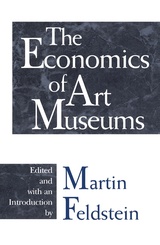 The Economics of Art Museums
Edited and with an Introduction by Martin Feldstein
University of Chicago Press, 1991 The National Bureau of Economic Research organized a project to explore the economic issues facing the major art museums of the United States. For this purpose NBER defined economics broadly to include not only the financial situation of the museums but also the management and growth of museum collections, the museums' relationship with the public, and the role of the government in supporting art museums.
This volume brings together nontechnical essays on these issues by economists associated with the NBER and personal statements by leaders of America's major national art museums and related foundations. It can be read not only by economists but also by museum officials and trustees. Museum directors generally come to their responsibilities with a background in art history and curatorial work but without experience in thinking about the management and public policy aspects of museum administration. Trustees who serve on museum boards generally have a background in business or law but have not previously tried to apply their experience to the unusual economic problems of museums. The background papers, the panelists' remarks, and the summary of the discussion will help them to approach their responsibilities with a better understanding of the problems and possibilities of the museum.
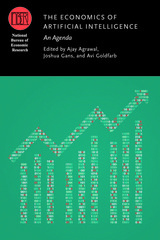 The Economics of Artificial Intelligence: An Agenda
Edited by Ajay Agrawal, Joshua Gans, and Avi Goldfarb
University of Chicago Press, 2019 Advances in artificial intelligence (AI) highlight the potential of this technology to affect productivity, growth, inequality, market power, innovation, and employment. This volume seeks to set the agenda for economic research on the impact of AI. It covers four broad themes: AI as a general purpose technology; the relationships between AI, growth, jobs, and inequality; regulatory responses to changes brought on by AI; and the effects of AI on the way economic research is conducted. It explores the economic influence of machine learning, the branch of computational statistics that has driven much of the recent excitement around AI, as well as the economic impact of robotics and automation and the potential economic consequences of a still-hypothetical artificial general intelligence. The volume provides frameworks for understanding the economic impact of AI and identifies a number of open research questions.
Contributors:
Daron Acemoglu, Massachusetts Institute of Technology
Philippe Aghion, Collège de France
Ajay Agrawal, University of Toronto
Susan Athey, Stanford University
James Bessen, Boston University School of Law
Erik Brynjolfsson, MIT Sloan School of Management
Colin F. Camerer, California Institute of Technology
Judith Chevalier, Yale School of Management
Iain M. Cockburn, Boston University
Tyler Cowen, George Mason University
Jason Furman, Harvard Kennedy School
Patrick Francois, University of British Columbia
Alberto Galasso, University of Toronto
Joshua Gans, University of Toronto
Avi Goldfarb, University of Toronto
Austan Goolsbee, University of Chicago Booth School of Business
Rebecca Henderson, Harvard Business School
Ginger Zhe Jin, University of Maryland
Benjamin F. Jones, Northwestern University
Charles I. Jones, Stanford University
Daniel Kahneman, Princeton University
Anton Korinek, Johns Hopkins University
Mara Lederman, University of Toronto
Hong Luo, Harvard Business School
John McHale, National University of Ireland
Paul R. Milgrom, Stanford University
Matthew Mitchell, University of Toronto
Alexander Oettl, Georgia Institute of Technology
Andrea Prat, Columbia Business School
Manav Raj, New York University
Pascual Restrepo, Boston University
Daniel Rock, MIT Sloan School of Management
Jeffrey D. Sachs, Columbia University
Robert Seamans, New York University
Scott Stern, MIT Sloan School of Management
Betsey Stevenson, University of Michigan
Joseph E. Stiglitz. Columbia University
Chad Syverson, University of Chicago Booth School of Business
Matt Taddy, University of Chicago Booth School of Business
Steven Tadelis, University of California, Berkeley
Manuel Trajtenberg, Tel Aviv University
Daniel Trefler, University of Toronto
Catherine Tucker, MIT Sloan School of Management
Hal Varian, University of California, Berkeley
 The Economics of Artificial Intelligence: Health Care Challenges
Edited by Ajay Agrawal, Joshua Gans, Avi Goldfarb, and Catherine E. Tucker
University of Chicago Press, 2024 A timely investigation of the potential economic effects, both realized and unrealized, of artificial intelligence within the United States healthcare system. In sweeping conversations about the impact of artificial intelligence on many sectors of the economy, healthcare has received relatively little attention. Yet it seems unlikely that an industry that represents nearly one-fifth of the economy could escape the efficiency and cost-driven disruptions of AI. The Economics of Artificial Intelligence: Health Care Challenges brings together contributions from health economists, physicians, philosophers, and scholars in law, public health, and machine learning to identify the primary barriers to entry of AI in the healthcare sector. Across original papers and in wide-ranging responses, the contributors analyze barriers of four types: incentives, management, data availability, and regulation. They also suggest that AI has the potential to improve outcomes and lower costs. Understanding both the benefits of and barriers to AI adoption is essential for designing policies that will affect the evolution of the healthcare system.
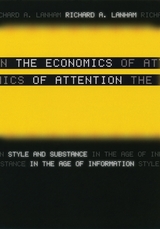 The Economics of Attention: Style and Substance in the Age of Information
Richard A. Lanham
University of Chicago Press, 2006 If economics is about the allocation of resources, then what is the most precious resource in our new information economy? Certainly not information, for we are drowning in it. No, what we are short of is the attention to make sense of that information.
With all the verve and erudition that have established his earlier books as classics, Richard A. Lanham here traces our epochal move from an economy of things and objects to an economy of attention. According to Lanham, the central commodity in our new age of information is not stuff but style, for style is what competes for our attention amidst the din and deluge of new media. In such a world, intellectual property will become more central to the economy than real property, while the arts and letters will grow to be more crucial than engineering, the physical sciences, and indeed economics as conventionally practiced. For Lanham, the arts and letters are the disciplines that study how human attention is allocated and how cultural capital is created and traded. In an economy of attention, style and substance change places. The new attention economy, therefore, will anoint a new set of moguls in the business world—not the CEOs or fund managers of yesteryear, but new masters of attention with a grounding in the humanities and liberal arts.
Lanham’s The Electronic Word was one of the earliest and most influential books on new electronic culture. The Economics of Attention builds on the best insights of that seminal book to map the new frontier that information technologies have created.
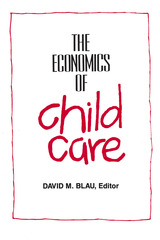 Economics of Child Care
David M. Blau
Russell Sage Foundation, 1991 "David Blau has chosen seven economists to write chapters that review the emerging economic literature on the supply of child care, parental demand for care, child care cost and quality, and to discuss the implications of these analyses for public policy. The book succeeds in presenting that research in understandable terms to policy makers and serves economists as a useful review of the child care literature....provides an excellent case study of the value of economic analysis of public policy issues." —Arleen Leibowitz, Journal of Economic Literature "There is no doubt this is a timely book....The authors of this volume have succeeded in presenting the economic material in a nontechnical manner that makes this book an excellent introduction to the role of economics in public policy analysis, and specifically child care policy....the most comprehensive introduction currently available." —Cori Rattelman, Industrial and Labor Relations Review
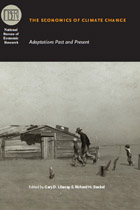 The Economics of Climate Change: Adaptations Past and Present
Edited by Gary D. Libecap and Richard H. Steckel
University of Chicago Press, 2011 While debates over the consequences of climate change are often pessimistic, historical data from the past two centuries indicate many viable opportunities for responding to potential changes. This volume takes a close look at the ways in which economies—particularly that of the United States—have adjusted to the challenges climate change poses, including institutional features that help insulate the economy from shocks, new crop varieties, irrigation, flood control, and ways of extending cultivation to new geographic areas. These innovations indicate that people and economies have considerable capacity to acclimate, especially when private gains complement public benefits. Options for adjusting to climate change abound, and with improved communication and the emergence of new information and technologies, the potential for adaptation will be even greater in the future.
 The Economics of Competition in the Transportation Industries
John R. Meyer, Merton J. Peck, John Stenason, and Charles Zwick
Harvard University Press Troubles in the transportation industries show the need for revising public policies and bringing them up to date. Neither regulatory nor managerial thinking has kept pace with technological changes that destroy many of the monopoly situations that once characterized transportation markets. The authors here assemble information concerning costs, market structures, and demand conditions for the rail, highway, pipeline, water, and air transportation industries. They take into account not only the cost of actual operations but related construction, capital, maintenance, retailing, and storage costs.
The approach is analytical rather than institutional or legalistic. In the view of the authors, the regulatory system should mainly, though not solely, seek to produce conditions ordinarily produced by competition, and should be maintained only as long as it will serve this purpose. The existing regulatory structure is often continued with no regard for its usefulness is a particular situation. Regulation has also been used as a means of perpetuating certain services that are unable to pay their costs but are considered socially desirable. In many cases, discontinuing uneconomic transportation services would unquestionably work undue hardships on innocent individuals. Yet continuance of these services under private enterprise requires higher charges on other transportation services. The question therefore arises of whether the harm done by these increased charges is greater than that which would result from abandoning the uneconomic services; the authors suspect that in a very large number of cases it is.
Insisting that transportation carriers continue to provide socially needed but uneconomic services imposes a standard that clearly conflicts with the cost minimization and efficiency criteria that are generally accepted as the proper managerial goals in a free enterprise economy. Even worse, regulation aimed at maintaining a given service often prevents the introduction of cheaper and better ways of performing certain transportation functions. The result is a net loss to both consumer and producer. The authors comment on the Motor Carrier Act of 1936, the Transportation Act of 1940 and the Weeks' Committee Report, and on the roles of the ICC and the CAB.
 The Economics of Creative Destruction: New Research on Themes from Aghion and Howitt
Ufuk Akcigit and John Van Reenen
Harvard University Press, 2023 A stellar cast of economists examines the roles of creative destruction in addressing today’s most important political and social questions.
Inequality is rising, growth is stagnant while rents accumulate, the environment is suffering, and the COVID-19 pandemic exposed every crack in the systems of global capitalism. How can we restart growth? Can our societies be made fairer? Editors Ufuk Akcigit and John Van Reenen assemble a world-leading group of social scientists and theorists to consider these questions and, in particular, how ideas about the economics of creative destruction may help solve the problems we face.
Most closely associated with Joseph Schumpeter, formalized by Philippe Aghion and Peter Howitt in the 1990s, the idea of innovation as creative destruction has become foundational in economics, reaching into almost every corner of the discipline—both theoretically and empirically. Now, at a time of rapid and disorienting change, is an opportune moment to pull the disparate strands of research together to assess what has been learned and continue an intellectual project that can aid economic decision-making in the decades to come.
The cutting-edge work in The Economics of Creative Destruction focuses on innovation and growth. Contributors offer illuminating insights into monopoly and inequality, the nature of the social safety net, climate change, and the ups and downs of regulation. Collectively, they suggest that governance has a role to play in capitalism, maximizing its benefits and minimizing its risks.
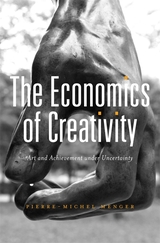 The Economics of Creativity: Art and Achievement under Uncertainty
Pierre-Michel Menger
Harvard University Press, 2014 Creative work has been celebrated as the highest form of achievement since at least Aristotle. But our understanding of the dynamics and market for creative work--artistic work in particular--often relies on unexamined clichés about individual genius, industrial engineering of talent, and the fickleness of fashion. Pierre-Michel Menger approaches the subject with new rigor, drawing on sociology, economics, and philosophy to build on the central insight that, unlike the work most of us do most of the time, creative work is governed by uncertainty. Without uncertainty, neither self-realization nor creative innovation is possible. And without techniques for managing uncertainty, neither careers nor profitable ventures would surface.
In the absence of clear paths to success, an oversupply of artists and artworks generates boundless differentiation and competition. How can artists, customers, entrepreneurs, and critics judge merit? Menger disputes the notion that artistic success depends solely on good connections or influential managers and patrons. Talent matters. But the disparity between superstardom and obscurity may hinge initially on minor gaps in intrinsic ability. The benefits of early promise in competition and the tendency of elite professionals to team up with one another amplify and disproportionately reward even small differences.
Menger applies his temporal and causal analysis of behavior under uncertainty to the careers and oeuvres of Beethoven and Rodin. The result is a thought-provoking book that brings clarity to our understanding of a world widely seen as either irrational or so free of standards that only power and manipulation count.
 The Economics of Crime: Lessons For and From Latin America
Edited by Rafael Di Tella, Sebastian Edwards, and Ernesto Schargrodsky
University of Chicago Press, 2010 Crime rates in Latin America are among the highest in the world, creating climates of fear and lawlessness in several countries. Despite this situation, there has been a lack of systematic effort to study crime in the region or the effectiveness of policies designed to tackle it. The Economics of Crime is a powerful corrective to this academic blind spot and makes an important contribution to the current debate on causes and solutions by applying lessons learned from recent developments in the economics of crime. The Economics of Crime addresses a variety of topics, including the impact of kidnappings on investment, mandatory arrest laws, education in prisons, and the relationship between poverty and crime. Utilizining research from within and without Latin America, this book illustrates the broad range of approaches that have been efficacious in studying crime in both developing and developed nations. The Economics of Crime is a vital text for researchers, policymakers, and students of both crime and of Latin American economic policy.
The Economics of Cuban Sugar
Jorge Perez-Lopez
University of Pittsburgh Press, 1991 Sugar, the backbone of the Cuban economic life for centuries, continues to dominate the economy of socialist Cuba. After initial attempts at diversification following the Revolution, the Cuban regime rehabilitated the sugar industry in 1965, making the country again vulnerable to swings in world market prices and the dangers of overdependence on a single agricultural product.
Pérez-López examines the various efforts at economic planning in the years following the Revolution and provides in-depth analysis of aspects particular to the sugar industry: cultivation, mechanization, energy and transportation, refining and the manufacture of sugar derivatives, production costs, and foreign trade.
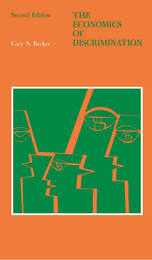 The Economics of Discrimination
Gary S. Becker
University of Chicago Press, 1971 This second edition of Gary S. Becker's The Economics of Discrimination has been expanded to include three further discussions of the problem and an entirely new introduction which considers the contributions made by others in recent years and some of the more important problems remaining.
Mr. Becker's work confronts the economic effects of discrimination in the market place because of race, religion, sex, color, social class, personality, or other non-pecuniary considerations. He demonstrates that discrimination in the market place by any group reduces their own real incomes as well as those of the minority.
The original edition of The Economics of Discrimination was warmly received by economists, sociologists, and psychologists alike for focusing the discerning eye of economic analysis upon a vital social problem—discrimination in the market place.
"This is an unusual book; not only is it filled with ingenious theorizing but the implications of the theory are boldly confronted with facts. . . . The intimate relation of the theory and observation has resulted in a book of great vitality on a subject whose interest and importance are obvious."—M.W. Reder, American Economic Review
"The author's solution to the problem of measuring the motive behind actual discrimination is something of a tour de force. . . . Sociologists in the field of race relations will wish to read this book."—Karl Schuessler, American Sociological Review
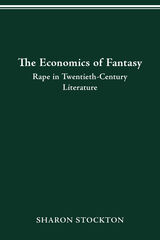 THE ECONOMICS OF FANTASY: RAPE IN TWENTIETH-CENTURY LITERATURE
Sharon Stockton
Ohio State University Press, 2006 In The Economics of Fantasy: Rape in Twentieth-Century Literature, Sharon Stockton examines the persistence and the evolution of the rape narrative in twentieth-century literature—the old story of male power and violence; female passivity and penetrability. What accounts for its persistence? How has the story changed over the course of the twentieth century? In this provocative book, Stockton investigates the manner in which the female body—or to be more precise, the violation of the female body—serves as a metaphor for a complex synthesis of masculinity and political economy. From high modernism to cyberpunk, Pound to Pynchon, Stockton argues that the compulsive return to the rape story, articulates—among other things—the gradual and relentless removal of Western man from the fantastical capitalist role of venturesome, industrious agency. The metamorphosis of the twentieth-century rape narrative registers a desperate attempt to preserve traditional patterns of robust, entrepreneurial masculinity in the face of economic forms that increasingly disallow illusions of individual authority.
It is important to make clear that the genre of rape story studied here presumes a white masculine subject and a white feminine object. Stockton makes the case that the aestheticized rape narrative reveals particular things about the way white masculinity represents itself. Plotting violent sexual fantasy on the grid of economic concerns locates masculine agency in relation to an explicitly contingent material system of power, value, and order. It is in this way that The Economics of Fantasy discloses the increased desperation with which the body has been made to carry ideology under systems of advanced capitalism.
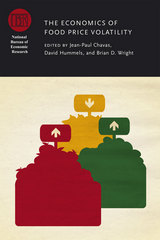 The Economics of Food Price Volatility
Edited by Jean-Paul Chavas, David Hummels, and Brian D. Wright
University of Chicago Press, 2014 There has been an increase in food price instability in recent years, with varied consequences for farmers, market participants, and consumers. Before policy makers can design schemes to reduce food price uncertainty or ameliorate its effects, they must first understand the factors that have contributed to recent price instability. Does it arise primarily from technological or weather-related supply shocks, or from changes in demand like those induced by the growing use of biofuel? Does financial speculation affect food price volatility?
The researchers who contributed to The Economics of Food Price Volatility address these and other questions. They examine the forces driving both recent and historical patterns in food price volatility, as well as the effects of various public policies in affecting this volatility. The chapters include studies of the links between food and energy markets, the impact of biofuel policy on the level and variability of food prices, and the effects of weather-related disruptions in supply. The findings shed light on the way price volatility affects the welfare of farmers, traders, and consumers.
The Economics of François Quesnay
Gianni Vaggi
Duke University Press, 1987 The author undertakes a new interpretation of physiocratic economics and its contributions to the foundation of economic science.
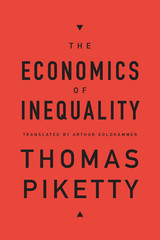 The Economics of Inequality
Thomas Piketty
Harvard University Press, 2015 Thomas Piketty—whose Capital in the Twenty-First Century pushed inequality to the forefront of public debate—wrote The Economics of Inequality as an introduction to the conceptual and factual background necessary for interpreting changes in economic inequality over time. This concise text has established itself as an indispensable guide for students and general readers in France, where it has been regularly updated and revised. Translated by Arthur Goldhammer, The Economics of Inequality now appears in English for the first time.
Piketty begins by explaining how inequality evolves and how economists measure it. In subsequent chapters, he explores variances in income and ownership of capital and the variety of policies used to reduce these gaps. Along the way, with characteristic clarity and precision, he introduces key ideas about the relationship between labor and capital, the effects of different systems of taxation, the distinction between “historical” and “political” time, the impact of education and technological change, the nature of capital markets, the role of unions, and apparent tensions between the pursuit of efficiency and the pursuit of fairness.
Succinct, accessible, and authoritative, this is the ideal place to start for those who want to understand the fundamental issues at the heart of one of the most pressing concerns in contemporary economics and politics.
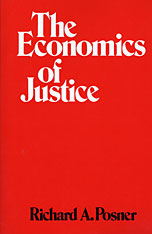 The Economics of Justice
Richard A. Posner
Harvard University Press, 1983 Richard A. Posner is probably the leading scholar in the rapidly growing field of the economics of law; he is also an extremely lucid writer. In this book, he applies economic theory to four areas of interest to students of social and legal institutions: the theory of justice, primitive and ancient social and legal institutions, the law and economics of privacy and reputation, and the law and economics of racial discrimination.
The book is designed to display the power of economics to organize and illuminate diverse fields in the study of nonmarket behavior and institutions. A central theme is the importance of uncertainty to an understanding of social and legal institutions. Another major theme is that the logic of the law, in many ways but not all, appears to be an economic one: that judges, for example, in interpreting the common law, act as if they were trying to maximize economic welfare.
Part I examines the deficiencies of utilitarianism as both a positive and a normative basis of understanding law, ethics, and social institutions, and suggests in its place the economist’s concept of “wealth maximization.”
Part II, an examination of the social and legal institutions of archaic societies, notably that of ancient Greece and primitive societies, argues that economic analysis holds the key to understanding such diverse features of these societies as reciprocal gift-giving, blood guilt, marriage customs, liability rules, and the prestige accorded to generosity. Many topics relevant to modern social and philosophical debate, including the origin of the state and the retributive theory of punishment, are addressed.
Parts III and IV deal with more contemporary social and jurisprudential questions. Part III is an economic analysis of privacy and the statutory and common law rules that protect privacy and related interests—rules that include the tort law of privacy, assault and battery, and defamation. Finally, Part IV examines, again from an economic standpoint, the controversial areas of racial and sexual discrimination, with special reference to affirmative action. Both Part III and Part IV develop as a sub-theme the issue of proper standards of constitutional adjudication by the Supreme Court.
 The Economics of Killing: How the West Fuels War and Poverty in the Developing World
Vijay Mehta
Pluto Press, 2012 Globalisation has created an interconnected world, but has not diminished violence, militarism and inequality. The Economics of Killing describes how the power of global elites, entrenched under globalisation, has created a deadly cycle of violence.
In this groundbreaking work, Vijay Mehta shows how attempts at peaceful national development are routinely blocked by Western powers. He locates the 2008 financial crisis in US attempts to block China's model of development. He shows how Europe and the US conspire with regional dictators to prevent countries from developing advanced industries, and how this system has fed terrorism.
Mehta argues that a different world is possible, based on policies of disarmament, demilitarisation and sustainable development. This original and thought-provoking book will be of great interest to anyone concerned about the consequences of endless war fuelled by the West.
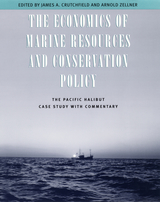 The Economics of Marine Resources and Conservation Policy: The Pacific Halibut Case Study with Commentary
Edited by James A. Crutchfield and Arnold Zellner
University of Chicago Press, 2002 How can we manage a so-called "renewable" natural resource such as a fishery when we don't know how renewable it really is? James A. Crutchfield and Arnold Zellner developed a dynamic and highly successful economic approach to this problem, drawing on extensive data from the Pacific halibut industry. Although the U.S. Department of the Interior published a report about their findings in 1962, it had very limited distribution and is now long out of print.
This book presents a complete reprint of Crutchfield and Zellner's pioneering study, together with a new introduction by the authors and four new papers by other scholars. These new studies cover the history of the Pacific halibut industry as well as the general and specific contributions of the original work—such as price-oriented conservation policy—to the fields of resource economics and management. The resulting volume integrates theory and practice in a clear, well-contextualized case study that will be important not just for environmental and resource economists, but also for leaders of industries dependent on any natural resource.
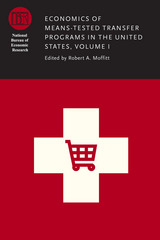 Economics of Means-Tested Transfer Programs in the United States, Volume I
Edited by Robert A. Moffitt
University of Chicago Press, 2016 Few government programs in the United States are as controversial as those designed to help the poor. From tax credits to medical assistance, the size and structure of the American safety net is an issue of constant debate.
These two volumes update the earlier Means-Tested Transfer Programs in the United States with a discussion of the many changes in means-tested government programs and the results of new research over the past decade. While some programs that experienced falling outlays in the years prior to the previous volume have remained at low levels of expenditure, many others have grown, including Medicaid, the Earned Income Tax Credit, the Supplemental Nutrition Assistance Program, and subsidized housing programs. For each program, the contributors describe its origins and goals, summarize its history and current rules, and discuss recipients’ characteristics and the types of benefits they receive.
This is an invaluable reference for researchers and policy makers that features detailed analyses of many of the most important transfer programs in the United States.
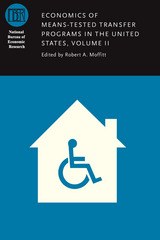 Economics of Means-Tested Transfer Programs in the United States, Volume II
Edited by Robert A. Moffitt
University of Chicago Press, 2016 Few government programs in the United States are as controversial as those designed to help the poor. From tax credits to medical assistance, the size and structure of the American safety net is an issue of constant debate.
These two volumes update the earlier Means-Tested Transfer Programs in the United States with a discussion of the many changes in means-tested government programs and the results of new research over the past decade. While some programs that experienced falling outlays in the years prior to the previous volume have remained at low levels of expenditure, many others have grown, including Medicaid, the Earned Income Tax Credit, the Supplemental Nutrition Assistance Program, and subsidized housing programs. For each program, the contributors describe its origins and goals, summarize its history and current rules, and discuss recipients’ characteristics and the types of benefits they receive.
This is an invaluable reference for researchers and policy makers that features detailed analyses of many of the most important transfer programs in the United States.
 The Economics of Multi-Plant Operation: An International Comparisons Study
Frederic M. Scherer, Alan Beckenstein, Erich Kaufer, Dennis R. Murphy, and Francine Bougeon-Massen
Harvard University Press, 1975 Why should manufacturing firms in many national industries maintain multiple small scale plants when they might produce the same output at a lower unit cost in a single large establishment? What specific benefits are attained through the operation of multiple plants? To address these questions, the authors conducted 125 in-depth interviews with businessmen actively involved in plant size and multi-plant operating decisions. They investigated the experience of twelve industries in six countries (West Germany, France, the United Kingdom, Sweden, Canada, and the United States).
The authors develop an economic theory of plant size and multi-plant decisions and apply it to analyze the statistical and qualitative evidence on factors affecting plant size choices. They then examine the extent of multi-plant operation, its statistical correlate, and the economy actually or potentially realizable from various modes of multi-plant operation. Implications are drawn from antitrust and foreign trade policy, the evolution of scientific business management, and the development of industrial organization knowledge.
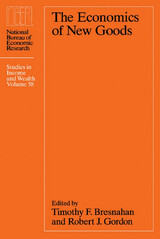 The Economics of New Goods
Edited by Timothy F. Bresnahan and Robert J. Gordon
University of Chicago Press, 1997 New goods are at the heart of economic progress. The eleven essays in this volume include historical treatments of new goods and their diffusion; practical exercises in measurement addressed to recent and ongoing innovations; and real-world methods of devising quantitative adjustments for quality change.
The lead article in Part I contains a striking analysis of the history of light over two millenia. Other essays in Part I develop new price indexes for automobiles back to 1906; trace the role of the air conditioner in the development of the American south; and treat the germ theory of disease as an economic innovation. In Part II essays measure the economic impact of more recent innovations, including anti-ulcer drugs, new breakfast cereals, and computers. Part III explores methods and defects in the treatment of quality change in the official price data of the United States, Canada, and Japan.
This pathbreaking volume will interest anyone who studies economic growth, productivity, and the American standard of living.
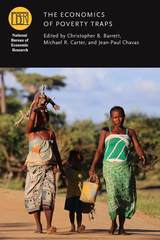 The Economics of Poverty Traps
Edited by Christopher B. Barrett, Michael R. Carter, and Jean-Paul Chavas
University of Chicago Press, 2018 What circumstances or behaviors turn poverty into a cycle that perpetuates across generations? The answer to this question carries especially important implications for the design and evaluation of policies and projects intended to reduce poverty. Yet a major challenge analysts and policymakers face in understanding poverty traps is the sheer number of mechanisms—not just financial, but also environmental, physical, and psychological—that may contribute to the persistence of poverty all over the world.
The research in this volume explores the hypothesis that poverty is self-reinforcing because the equilibrium behaviors of the poor perpetuate low standards of living. Contributions explore the dynamic, complex processes by which households accumulate assets and increase their productivity and earnings potential, as well as the conditions under which some individuals, groups, and economies struggle to escape poverty. Investigating the full range of phenomena that combine to generate poverty traps—gleaned from behavioral, health, and resource economics as well as the sociology, psychology, and environmental literatures—chapters in this volume also present new evidence that highlights both the insights and the limits of a poverty trap lens.
The framework introduced in this volume provides a robust platform for studying well-being dynamics in developing economies.
 The Economics of Privacy
Edited by Avi Goldfarb and Catherine E. Tucker
University of Chicago Press, 2024 A foundational new collection examining the mechanics of privacy in the digital age. The falling costs of collecting, storing, and processing data have allowed firms and governments to improve their products and services, but have also created databases with detailed individual-level data that raise privacy concerns. This volume summarizes the research on the economics of privacy and identifies open questions on the value of privacy, the roles of property rights and markets for privacy and data, the relationship between privacy and inequality, and the political economy of privacy regulation. Several themes emerge across the chapters. One is that it may not be possible to solve privacy concerns by creating a market for the right to privacy, even if property rights are well-defined and transaction costs are low. Another is that it is difficult to measure and value the benefits of privacy, particularly when individuals have an intrinsic preference for privacy. Most previous attempts at valuation have focused only on quantifiable economic outcomes, such as innovation. Finally, defining privacy through an economic lens is challenging. The broader academic and legal literature includes many distinct definitions of privacy, and different definitions may be appropriate in different contexts. The chapters explore a variety of frameworks for examining these questions and provide a range of new perspectives on the role of economics research in understanding the benefits and costs of privacy and of data flows. As the digital economy continues to expand the scope of economic theory and research, The Economics of Privacy provides the most comprehensive survey to date of this field and its next steps.
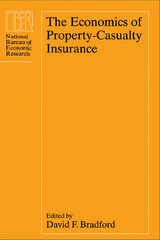 The Economics of Property-Casualty Insurance
Edited by David F. Bradford
University of Chicago Press, 1998 The Economics of Property-Casualty Insurance presents new research and findings on key aspects of the economics of the property-casualty insurance industry. The volume explores the industrial organization, regulation, financing, and taxation of this business.
The first paper, on external financing and insurance cycles, contains a wealth of information on trends and patterns in the industry's financial structure. The last essay, which compares performance of stock and mutual insurance companies, takes a fresh look at the way a company's organizational structure affects its responses to different economic situations. Two papers focus on rate regulation in the auto insurance industry, and provide broad overviews of the structure and economics of the insurance industry as a whole. Also addressed are the system of regulating insurance companies in the United States, who insures the insurers, and the effects of tax law changes in the 1980s on the prices of insurance policies.
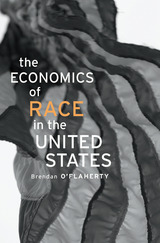 The Economics of Race in the United States
Brendan O'Flaherty
Harvard University Press, 2015 Brendan O’Flaherty brings the tools of economic analysis—incentives, equilibrium, optimization, and more—to bear on contentious issues of race in the United States. In areas ranging from quality of health care and education, to employment opportunities and housing, to levels of wealth and crime, he shows how racial differences among blacks, whites, Hispanics, and Asian Americans remain a powerful determinant in the lives of twenty-first-century Americans. More capacious than standard texts, The Economics of Race in the United States discusses important aspects of history and culture and explores race as a social and biological construct to make a compelling argument for why race must play a major role in economic and public policy. People are not color-blind, and so policies cannot be color-blind either.
Because his book addresses many topics, not just a single area such as labor or housing, surprising threads of connection emerge in the course of O’Flaherty’s analysis. For example, eliminating discrimination in the workplace will not equalize earnings as long as educational achievement varies by race—and educational achievement will vary by race as long as housing and marriage markets vary by race. No single engine of racial equality in one area of social and economic life is strong enough to pull the entire train by itself. Progress in one place is often constrained by diminishing marginal returns in another. Good policies can make a difference, and only careful analysis can figure out which policies those are.
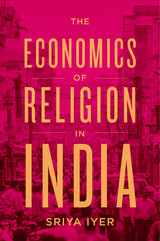 The Economics of Religion in India
Sriya Iyer
Harvard University Press, 2018 Religion has not been a popular target for economic analysis. Yet the tools of economics can offer deep insights into how religious groups compete, deliver social services, and reach out to potential converts—how, in daily life, religions nurture and deploy market power. Sriya Iyer puts these tools to use in an expansive, creative study of India, one of the most religiously diverse countries in the world.
Iyer explores how growth, inequality, education, technology, and social trends both affect and are affected by religious groups. Her exceptionally rich data—drawn from ten years of research, including a survey of almost 600 religious organizations in seven states—reveal the many ways religions interact with social welfare and political conflict. After India’s economy was liberalized in 1991, she shows, religious organizations substantially increased their provision of services, compensating for the retreat of the state. Iyer’s data also indicate that religious violence is more common where economic growth is higher, apparently because growth increases inequality, which sectarian politicians might exploit to encourage hostility toward other religions. As inequality leads to social polarization, religious doctrines become more extreme. But there are hopeful patterns in Iyer’s data, too. Religious organizations, on balance, play a positive role in India’s socioeconomic development, and women’s participation in religious life is on the rise.
The Economics of Religion in India has much to teach us about India and other pluralistic societies the world over, and about the power of economics to illuminate some of societies’ deepest beliefs and dynamics.
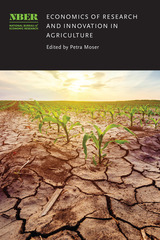 Economics of Research and Innovation in Agriculture
Edited by Petra Moser
University of Chicago Press, 2021 Feeding the world’s growing population is a critical policy challenge for the twenty-first century. With constraints on water, arable land, and other natural resources, agricultural innovation is a promising path to meeting the nutrient needs for future generations. At the same time, potential increases in the variability of the world’s climate may intensify the need for developing new crops that can tolerate extreme weather. Despite the key role for scientific breakthroughs, there is an active discussion on the returns to public and private spending in agricultural R&D, and many of the world’s wealthier countries have scaled back the share of GDP that they devote to agricultural R&D. Dwindling public support leaves universities, which historically have been a major source of agricultural innovation, increasingly dependent on industry funding, with uncertain effects on the nature and direction of agricultural research. All of these factors create an urgent need for systematic empirical evidence on the forces that drive research and innovation in agriculture. This book aims to provide such evidence through economic analyses of the sources of agricultural innovation, the challenges of measuring agricultural productivity, the role of universities and their interactions with industry, and emerging mechanisms that can fund agricultural R&D.
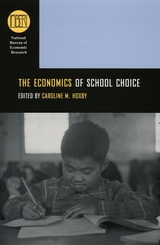 The Economics of School Choice
Edited by Caroline M. Hoxby
University of Chicago Press, 2003 Now that the U.S. Supreme Court has declared school voucher programs constitutional, the many unanswered questions concerning the potential effects of school choice will become especially pressing. Contributors to this volume draw on state-of-the-art economic methods to answer some of these questions, investigating the ways in which school choice affects a wide range of issues.
Combining the results of empirical research with analyses of the basic economic forces underlying local education markets, The Economics of School Choice presents evidence concerning the impact of school choice on student achievement, school productivity, teachers, and special education. It also tackles difficult questions such as whether school choice affects where people decide to live and how choice can be integrated into a system of school financing that gives children from different backgrounds equal access to resources. Contributors discuss the latest findings on Florida's school choice program as well as voucher programs and charter schools in several other states.
The resulting volume not only reveals the promise of school choice, but examines its pitfalls as well, showing how programs can be designed that exploit the idea's potential but avoid its worst effects. With school choice programs gradually becoming both more possible and more popular, this book stands out as an essential exploration of the effects such programs will have, and a necessary resource for anyone interested in the idea of school choice.
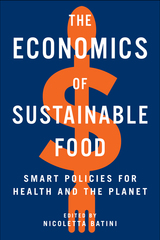 The Economics of Sustainable Food: Smart Policies for Health and the Planet
Edited by Nicoletta Batini
Island Press, 2021 Producing food industrially like we do today causes tremendous global economic losses in terms of malnutrition, diseases, and environmental degradation. But because the food industry does not bear those costs and the price tag for these losses does not show up at the grocery store, it is too often ignored by economists and policymakers.
The Economics of Sustainable Food details the true cost of food for people and the planet. It illustrates how to transform our broken system, alleviating its severe financial and human burden. The key is smart macroeconomic policy that moves us toward methods that protect the environment like regenerative land and sea farming, low-impact urban farming, and alternative protein farming, and toward healthy diets. The book’s multidisciplinary team of authors lay out detailed fiscal and trade policies, as well as structural reforms, to achieve those goals.
Chapters discuss strategies to make food production sustainable, nutritious, and fair, ranging from taxes and spending to education, labor market, health care, and pension reforms, alongside regulation in cases where market incentives are unlikely to work or to work fast enough. The authors carefully consider the different needs of more and less advanced economies, balancing economic development and sustainability goals. Case studies showcase successful strategies from around the world, such as taxing foods with a high carbon footprint, financing ecosystems mapping and conservation to meet scientific targets for healthy biomes permanency, subsidizing sustainable land and sea farming, reforming health systems to move away from sick care to preventive, nutrition-based care, and providing schools with matching funds to purchase local organic produce.
In the years ahead, few issues will be more important for individual prosperity and the global economy than the way we produce our food and what food we eat. This roadmap for reform is an invaluable resource to help global policymakers improve countless lives.
The Economics of the Manuscript and Rare Book Trade, ca. 1890–1939
Federico Botana
Arc Humanities Press, 2024 The market for rare books has been characterized as unpredictable, and driven by the whims of a small number of rich individuals. Yet behind the headlines announcing new auction records, a range of sources make it possible to analyze the market as a whole. This book introduces the economics of the trade in manuscripts and rare books during the turbulent period ca. 1890–1939. It demonstrates how surviving sources, even when incomplete and inconsistent, can be used to tackle questions about the operation of the rare book trade, including how books were priced, profit margins, accounting practices, and books as investments, from the perspectives of both dealers and collectors.
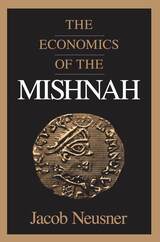 The Economics of the Mishnah
Jacob Neusner
University of Chicago Press, 1990 In this compelling study, Jacob Neusner argues that economics is an active and generative ingredient of the system of the Mishnah. The Mishnah directly addresses such economic concerns as the value of work, agronomics, currency, commerce and the marketplace, and correct management of labor and of the household. In all its breadth, the Mishnah poses the question of the critical place occupied by the economy in society under God's rule.
The Economics of the Mishnah is the first book to examine the place of economic theory generally in the Judaic system of the Mishnah. Jacob Neusner begins by surveying previous work on economics and Judaism, the best known being Werner Sombart's The Jews and Modern Capitalism. The mistaken notion that Jews have had a common economic history has outlived the demise of Sombart's argument, and it is a notion that Neusner overturns before discussing the Mishnaic economics.
Only in Aristotle, Neusner argues, do we find an equal to the Mishnah's accomplishment in engaging economics in the service of a larger systemic statement. Neusner shows that the framers of the Mishnah imagined a distributive economy functioning through the Temple and priesthood, while also legislating for the action of markets. The economics of the Mishnah, then, is to some extent a mixed economy. The dominant, distributive element in this mixed economy, Neusner contends, derives from the belief that the Temple and its designated castes on earth exercise God's claim to the ownership of the holy land. He concludes by considering the implications of the derivation of the Mishnah's economics from the interests of the undercapitalized and overextended farmer.
The Economics of Trade Unions
Albert Rees
University of Chicago Press, 1989 In this third edition of his highly acclaimed and influential study, Albert Rees updates his material to reflect the major changes in the labor scene occurring during the 1970s and 1980s. New to this edition is a chapter on the decline of private sector unions, and other chapters have been substantially revised. The treatment of the effect of unions on relative wages has been completely recast to reflect the results of recent research. Students of labor economics will find that Rees's well-balanced account provides an excellent, comprehensive view of all aspects of the activities of unions, from their early development and history, through analysis of their sources of power, to the effects of their policies. In the final chapters, Rees broadens his evaluation to survey noneconomic as well as economic aspects of union activity.
 Economics of Worldwide Stagflation
Michael Bruno and Jeffrey D. Sachs
Harvard University Press, 1985 This book sets forth both a theory and a comparative empirical analysis of stagflation, that peculiar combination of high unemployment, slow growth, and spurts of high inflation bedeviling the advanced industrial nations during the past fifteen years.
The authors first construct a small macroeconomic model that takes full account of aggregate demand and supply forces in the determination of output, employment, and the price level, in both a single-economy and a multi-economy setting. They then apply the model to provide an understanding of comparative performance of industrial countries in the areas of unemployment, inflation, productivity, and investment growth. They argue convincingly that the decay of the major economies during this period resulted from the supply shocks of the 1970s, such as the two major OPEC oil-price increases, and from the consequent policy-induced decrease in demand in response to inflationary pressures. Their analysis differs markedly from similar studies in that it takes specific account of institutional differences in the labor markets of the various economies. This helps to explain in particular the divergent adjustment profiles of the United States and Europe.
Michael Bruno and Jeffrey D. Sachs make several key recommendations for the mix of demand management and incomes policies necessary to combat stagflation in individual countries as well as for the coordination of macroeconomic policies among the major industrial nations.
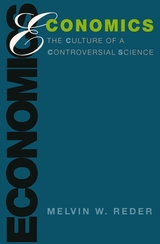 Economics: The Culture of a Controversial Science
Melvin W. Reder
University of Chicago Press, 1998 Economics has always had an unstable reputation in the academic world as well as in the public eye. Some consider economists to be scientists while others see them as disguised ideologues. The resulting insecurity of their discipline's status has driven economists continually to redefine its scope, methods, and content.
Since the 1930s economists have increasingly emphasized the scientific, quantitative side of their field, which has directed research to topics that can be elaborated through mathematical models. Economist Melvin Reder argues that this ongoing historical shift has been the result of pressure from two directions: from society's demand that expert advice be based on "scientific findings," and from economists themselves, who have wanted to view their own profession as a science. This book describes the profession of economics as it has developed in response to these challenges.
The diversity of the responses points to persistent internal disagreements within the economics community about its proper scope and methods. These disagreements, in turn, have led to incompatible proposals for the direction of research and divergent recommendations for public policy. Although Reder does not pretend to resolve these difficulties, he appraises different arguments and demonstrates how they have influenced both economists' behavior and public esteem for the profession. While recognizing that serious questions remain about economics's scientific status and practical utility, this book shows where economics has obtained practically usable results and where its fruits have been limited to elaboration of analytical constructions of uncertain applicability.
"[A] fascinating account of the sociology and philosophy of a profession. . . . This is an important book about an important field."—John L. Casti, New Scientist
Economics Transformed: Discovering the Brilliance of Marx
Robert Albritton
Pluto Press, 2007 Robert Albritton brings to life the classic concepts in Marx's economic thought. As well as examining these essential points of Marxist theory, he shows that they offer great potential for further study. Deeply critical of the way economics is taught and studied today, this is a textbook that will appeal to anyone who wants a forward-thinking approach to the discipline that's free from the constraints of neo-classical orthodoxy. Taking up key aspects of Marx's work, including surplus value theory,dialectical reasoning and the commodity form, Albritton highlights their relevance in the modern world-and explains why mainstream economics has been so blind to their revolutionary potential. Written with style and clarity, it is perfect for economics undergraduates.
Economics--Mathematical Politics or Science of Diminishing Returns?
Alexander Rosenberg
University of Chicago Press, 1992 Economics today cannot predict the likely outcome of specific events any better than it could in the time of Adam Smith. This is Alexander Rosenberg's controversial challenge to the scientific status of economics. Rosenberg explains that the defining characteristic of any science is predictive improvability—the capacity to create more precise forecasts by evaluating the success of earlier predictions—and he forcefully argues that because economics has not been able to increase its predictive power for over two centuries, it is not a science.
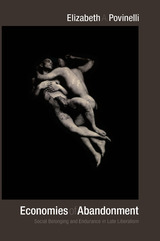 Economies of Abandonment: Social Belonging and Endurance in Late Liberalism
Elizabeth A. Povinelli
Duke University Press, 2011 In Economies of Abandonment, Elizabeth A. Povinelli explores how late liberal imaginaries of tense, eventfulness, and ethical substance make the global distribution of life and death, hope and harm, and endurance and exhaustion not merely sensible but also just. She presents new ways of conceptualizing formations of power in late liberalism—the shape that liberal governmentality has taken as it has responded to a series of legitimacy crises in the wake of anticolonial and new social movements and, more recently, the “clash of civilizations” after September 11. Based on longstanding ethnographic work in Australia and the United States, as well as critical readings of legal, academic, and activist texts, Povinelli examines how alternative social worlds and projects generate new possibilities of life in the context of ordinary and extraordinary acts of neglect and surveillance. She focuses particularly on social projects that have not yet achieved a concrete existence but persist at the threshold of possible existence. By addressing the question of the endurance, let alone the survival, of alternative forms of life, Povinelli opens new ethical and political questions.
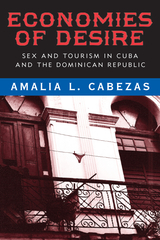 Economies of Desire: Sex and Tourism in Cuba and the Dominican Republic
Amalia L. Cabezas
Temple University Press, 2009 Is a native-born tour guide who has sex with tourists—in exchange for dinner or gifts or cash—merely a prostitute or gigolo? What if the tourist continues to send gifts or money to the tour guide after returning home? As this original and provocative book demonstrates, when it comes to sex—and the effects of capitalism and globalization —nothing is as simple as it might seem. Based on ten years of research, Economies of Desire is the first ethnographic study to examine the erotic underpinnings of transnational tourism. It offers startling insights into the commingling of sex, intimacy, and market forces in Cuba and the Dominican republic, two nations where tourism has had widespread effects. In her multi-layered analyses, amalia cabezas reconceptualizes our understandings of informal economies (particularly "affective economies"), "sex workers," and “sexual tourism,” and she helps us appreciate how money, sex and love are intertwined within the structure of globalizing capitalism.
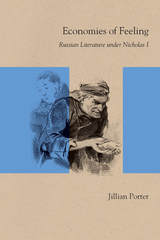 Economies of Feeling: Russian Literature under Nicholas I
Jillian Porter
Northwestern University Press, 2017 Economies of Feeling offers new explanations for the fantastical plots of mad or blocked ambition that set the nineteenth-century Russian prose tradition in motion. Jillian Porter compares the conceptual history of social ambition in post-Napoleonic France and post-Decembrist Russia and argues that the dissonance between foreign and domestic understandings of this economic passion shaped the literature of Nicholas I’s reign (1825 —1855).
Porter shows how, for Pushkin, Gogol, Dostoevsky, and Faddei Bulgarin, ambition became a staging ground for experiments with transnational literary exchange. In its encounters with the celebrated Russian cultural value of hospitality and the age-old vice of miserliness, ambition appears both timely and anachronistic, suspiciously foreign and disturbingly Russian—it challenges readers to question the equivalence of local and imported words, feelings, and forms.
Economies of Feeling examines founding texts of nineteenth-century Russian prose alongside nonliterary materials from which they drew energy—from French clinical diagnoses of “ambitious monomania” to the various types of currency that proliferated under Nicholas I. It thus contributes fresh and fascinating insights into Russian characters’ impulses to attain rank and to squander, counterfeit, and hoard. Porter’s interdisciplinary approach will appeal to scholars of comparative as well as Russian literature.
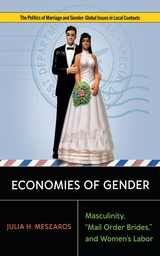 Economies of Gender: Masculinity, "Mail Order Brides," and Women’s Labor
Julia H. Meszaros
Rutgers University Press, 2026 Economies of Gender: Masculinity, "Mail Order Brides," and Women's Labor offers a provocative exploration of the international dating industry, challenging simplistic narratives of human trafficking and scams while shedding light on the economic dynamics of gender. Through twelve years of fieldwork, the book delves into the motivations and experiences of men who seek relationships abroad, driven by dissatisfaction with Western women who, they believe, no longer embody traditional femininity. By examining romantic tourism hotspots such as Ukraine, Colombia, and the Philippines, Economies of Gender reveals how these international settings serve as "intimate frontiers," where men seek to extract femininity capital and bolster their status. It illuminates the often-unseen economic underpinnings of relationships and questions how global gender dynamics shape desires, fantasies, and intimate markets. Through its compelling analysis, the book broadens the conversation on gender, power, and the commodification of intimacy in a globalized world.
 Economies of Praise: Value, Labor, and Form in Seventeenth-Century English Poetry
Ryan Netzley
Northwestern University Press, 2024 Reevaluates early modern poems of praise as, paradoxically, challenging an artistic economy that values exchange and productivity
Early modern poems of praise typically insist that they do not have a purpose or enact real labor beyond their effortless listing of laudable qualities. And yet the poets discussed in this study, including Ben Jonson, Andrew Marvell, Anne Bradstreet, Lucy Hutchinson, and John Milton, hint at an alternative aesthetic economy at work in their verse. Poetic praise, it turns out, might show us a social world outside the organizing principle of exchange.
In Economies of Praise: Value, Labor, and Form in Seventeenth‑Century English Poetry, Ryan Netzley explores how poems of praise imagine alternatives to market and gift economies and point instead to a self-contained aesthetic economy that works against a more expansive and productivist understanding of literary art. By depicting exchange as inconsequential, unproductive, and redundant rather than a necessary constituent of social order, these poems model for modern readers a world without the imperative to create, appraise, and repeatedly demonstrate one’s own value.
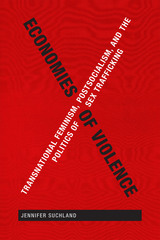 Economies of Violence: Transnational Feminism, Postsocialism, and the Politics of Sex Trafficking
Jennifer Suchland
Duke University Press, 2015 Recent human rights campaigns against sex trafficking have focused on individual victims, treating trafficking as a criminal aberration in an otherwise just economic order. In Economies of Violence Jennifer Suchland directly critiques these explanations and approaches, as they obscure the reality that trafficking is symptomatic of complex economic and social dynamics and the economies of violence that sustain them. Examining United Nations proceedings on women's rights issues, government and NGO anti-trafficking policies, and campaigns by feminist activists, Suchland contends that trafficking must be understood not solely as a criminal, gendered, and sexualized phenomenon, but as operating within global systems of precarious labor, neoliberalism, and the transition from socialist to capitalist economies in the former Soviet Union and Eastern Bloc. In shifting the focus away from individual victims, and by underscoring trafficking's economic and social causes, Suchland provides a foundation for building more robust methods for combatting human trafficking.
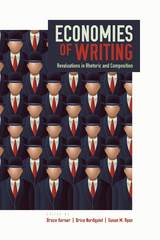 Economies of Writing: Revaluations in Rhetoric and Composition
Bruce Horner
Utah State University Press, 2016 Economies of Writing advances scholarship on political economies of writing and writing instruction, considering them in terms of course subject, pedagogy, technology, and social practice. Taking the "economic" as a necessary point of departure and contention for the field, the collection insists that writing concerns are inevitably participants in political markets in their consideration of forms of valuation, production, and circulation of knowledge with labor and with capital. Approaching the economic as plural, contingent, and political, chapters explore complex forces shaping the production and valuation of literacies, languages, identities, and institutions and consider their implications for composition scholarship, teaching, administration, and public rhetorics. Chapters engage a range of issues, including knowledge transfer, cyberpublics, graduate writing courses, and internationalized web domains. Economies of Writing challenges dominant ideologies of writing, writing skills, writing assessment, language, writing technology, and public rhetoric by revealing the complex and shifting valuations of writing practices as they circulate within and across different economies. The volume is a significant contribution to rhetoric and composition’s understanding of and ways to address its seemingly perennial unease about its own work. Contributors: Anis Bawarshi, Deborah Brandt, Jenn Fishman, T. R. Johnson, Jay Jordan, Kacie Kiser, Steve Lamos, Donna LeCourt, Rebecca Lorimer Leonard, Samantha Looker, Katie Malcolm, Paul Kei Matsuda, Joan Mullin, Jason Peters, Christian J. Pulver, Kelly Ritter, Phyllis Mentzell Ryder, Tony Scott, Scott Wible, Yuching Jill Yang, James T. Zebroski
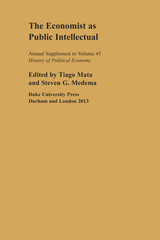 The Economist as Public Intellectual, Volume 45
Steven G. Medema and Tiago Mata, special issue editors
Duke University Press The Economist as Public Intellectual examines the power of individual economists to intervene in public affairs and argues that economists’ public interventions have had profound consequences for both the structure and the content of the public sphere. Focusing on the encounters between economists and their publics in the United Kingdom and the United States, the essays in this volume demonstrate how publicity served different purposes in the evolving configurations of academe, business, government, and media during the twentieth century. The economists discussed include Gary Becker, Milton Friedman, John Kenneth Galbraith, and John Maynard Keynes. This volume concludes with a timely examination of economists’ reaction to the current financial downturn. Subscribers to History of Political Economy will receive a copy of The Economist as Public Intellectual. Tiago Mata is Senior Research Associate in the Department of History and Philosophy of Science at the University of Cambridge. Steven G. Medema is Professor of Economics at the University of Colorado at Denver.
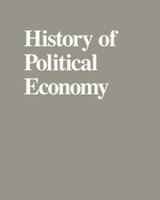 Economists Lives: Biography and Autobiography in the History of Economics, Volume 39
E. Roy Weintraub and Evelyn L. Forget, eds.
Duke University Press This collection of essays, a supplement to History of Political Economy, brings together prominent scholars from economics, sociology, literature, and history to examine the role of biography and autobiography in the history of economics. The first of its kind, this volume looks at the relevance of first-person accounts to narrative histories of economics. The essays consider both the potential and the limits of life writing, which has traditionally been used sparingly by historians of economics, and examine types of biographies, the relationship between autobiography and identity, and the writing of biography. Contributors to this collection question whether biography is essential to understanding the history of economic ideas and consider how autobiographical materials should be read and interpreted by historians. Articles consider the treatment of autobiographical materials such as conversations and testimonies, the construction of heroes and villains, the relationship between scientific biography and literary biography, and concerns related to living subjects. Several essays address the role of biography and autobiography in the study of economists such as F. A. Hayek, Harry Johnson, Alfred Marshall, John Maynard Keynes, Oskar Morgenstern, and François Quesnay, concluding with several accounts of the interconnection of the historians’ projects with their own autobiographies. All 2007 subscribers to History of Political Economy will receive a copy of “Economists’ Lives: Biography and Autobiography in the History of Economics” as part of their subscription. Contributors
Roger E. Backhouse
Bruce Caldwell
Loïc Charles
William Coleman
Robert W. Dimand
Paul John Eakin
Ross B. Emmett
Evelyn L. Forget
Craufurd D. Goodwin
Peter Groenewegen
Malachi Haim Hacohen
Jan-Otmar Hesse
Patricia Laurence
Frederic S. Lee
Robert Leonard
Tiago Mata
D. E. Moggridge
Jeremy D. Popkin
Mike Reay
Christine Théré
E. Roy Weintraub
Economists Papers, 1750-1950: A Guide to Archive and other Manuscript Sources for the History of British and Irish Economic Thought
R. P. Sturges
Duke University Press, 1975 The object of this volume is to provide scholars undertaking research in the history of British economic thought with a systematic listing of the available sources of manuscript material. It is the first work of its kind, and is based on extensive search inquiry into the scattered public and private sources of personal papers and correspondence of British economists. Over one hundred and fifty listings are printed here. They include numerous lesser figures as well as the most distinguished contributors to the varied literature of economics in the period since 1700. The Guide should, therefore, be of interest not only to specialist historians of economics but also to those concerned with the wider role of economic ideas in political debate and the formation of public opinion.
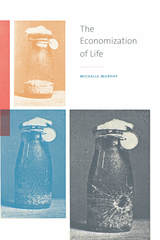 The Economization of Life
M. Murphy
Duke University Press, 2017 What is a life worth? In the wake of eugenics, new quantitative racist practices that valued life for the sake of economic futures flourished. In The Economization of Life, M. Murphy provocatively describes the twentieth-century rise of infrastructures of calculation and experiment aimed at governing population for the sake of national economy, pinpointing the spread of a potent biopolitical logic: some must not be born so that others might live more prosperously. Resituating the history of postcolonial neoliberal technique in expert circuits between the United States and Bangladesh, Murphy traces the methods and imaginaries through which family planning calculated lives not worth living, lives not worth saving, and lives not worth being born. The resulting archive of thick data transmuted into financialized “Invest in a Girl” campaigns that reframed survival as a question of human capital. The book challenges readers to reject the economy as our collective container and to refuse population as a term of reproductive justice.
 Economizing Mind, 1870–2015: When Economics and Psychology Met . . . or Didn’t
Marina Bianchi and Neil De Marchi, special issue editors
Duke University Press, 2016 A supplement to History of Political Economy
Economists and psychologists share an interest in explaining how people make the choices that they do. However, economists have tended to stress individual rationality, shaped by economic motives and expressed in formal logical or mathematical models, while psychologists have preferred to identify influences through experimentation. In recent decades, behavioral economics has bridged the two fields and challenged the traditional economic assumption that individuals choose rationally. The essays collected here provide a longer view and reflect on episodic contact between psychology and economics beginning in the late nineteenth century. They help explain why meaningful, sustained joint inquiry eluded both disciplines for so long and usefully complement the recent inclination of researchers in each field to find inadequacy in the other.
Contributors: Marina Bianchi, Simon J. Cook, Neil De Marchi, José Edwards, Tiziana Foresti, Craufurd D. Goodwin, Judy L. Klein, Harro Maas, Ivan Moscati, John Staddon, Andrej Svorenčík
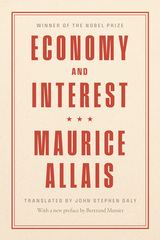 Economy and Interest: A New Presentation of the Fundamental Problems Related to the Economic Role of the Rate of Interest and Their Solutions
Maurice Allais
University of Chicago Press, 2024 The essential work from the Nobel Prize-winning virtuoso of twentieth-century economics, translated to English for the first time. Few scholars advanced the frontier of economic modeling more than French economist Maurice Allais. Allais’s contributions—beyond his famous Allais’s Paradox—earned him the Nobel Prize and drew comparisons to the works of Paul Samuelson and even some modern mathematical behavioral economists. Allais’s accomplishments, however, went largely unread by non-Francophone readers due to the challenge of their translation for publishers. The effects of this gap are immeasurable. As Paul Samuelson wrote, “Had Allais's earliest writings been in English, a whole generation of economic theory would have taken a different course.” Economy and Interest is the milestone translation of Allais's most influential work, one whose staggering findings predate their accepted formulations by other famed economists decades later. In its sweep and technical virtuosity, Economy and Interest is certain to delight and challenge new generations of English-language readers.
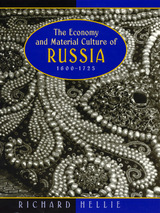 The Economy and Material Culture of Russia, 1600-1725
Richard Hellie
University of Chicago Press, 1999 In this extraordinary and definitive study of the Russian economy from 1600-1725, Richard Hellie offers a glimpse of the material life of the people of Muscovy during that tumultuous period—how they lived, what they ate, how they were taxed, what their wages allowed them to enjoy. Making these determinations required more than a decade of work and analysis of over 107,000 records. The resulting book devotes chapters to each category of consumer goods, in which transactions involving the product are summarized. Hellie further provides notes and commentary on the transactions to locate their place in the full Russian economy.
Impressive in scope and data analysis, Economy and Material Culture of Russia, 1600-1725 will be an invaluable resource and reference work for all readers interested in economic history and the history of material culture. Since there is no comparable one-volume work for any other society at any other time in history, Hellie's is a truly unique and profound achievement.
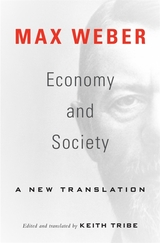 Economy and Society: A New Translation
Edited and translated by Keith Tribe
Harvard University Press, 2019 The definitive new translation of Max Weber’s classic work of social theory—arguably the most important book by the foremost social theorist of the twentieth century.
Max Weber’s Economy and Society is the foundational text for the social sciences of the twentieth and twenty-first centuries, presenting a framework for understanding the relations among individual action, social action, economic action, and economic institutions. It also provides a classification of political forms based upon “systems of rule” and “rulership” that has shaped debate about the nature and role of charisma, tradition, legal authority, and bureaucracy.
Keith Tribe’s major new translation presents Economy and Society as it stood when Weber died in June 1920, with three complete chapters and a fragment of a fourth. One of the English-speaking world’s leading experts on Weber’s thought, Tribe has produced a uniquely clear and faithful translation that balances accuracy with readability. He adds to this a substantial introduction and commentary that reflect the new Weber scholarship of the past few decades.
This new edition will become the definitive translation of one of the few indisputably great intellectual works of the past 150 years.
 Economy and Society in Baroque Portugal, 1668-1703
Carl A. Hanson
University of Minnesota Press, 1981
Economy and Society in Baroque Portugal, 1668–1703 was first published in 1981. Minnesota Archive Editions uses digital technology to make long-unavailable books once again accessible, and are published unaltered from the original University of Minnesota Press editions.
The late seventeenth century in Portugal was a period of apparent calm, and few historians have given it much attention. Portugal's Golden Age of worldwide expansion had made sixteenth-century Lisbon a great commercial center, but other European nations with more advanced economies surpassed Portugal's achievement, and during the seventeenth century agricultural, economic, and political problems all contributed to Portugal's decline. In 1668, at the conclusion of a long war with Spain to restore Portuguese sovereignty, Pedro II began a reign of 38 years, first as regent for a feckless brother ad after 1683 as king. The history of Portugal during his reign is the subject of this book.
Carl A. Hanson looks at this relatively unexamined era and finds, behind the facade of baroque calm, subtle but dramatic shifts in the socio-economic foundations of the age. In an effort to cope with economic depression Pedro's government hearkened to enthusiastic reports of Colbert's mercantile policies in France, and tried to encourage the expansion of domestic manufacturing. Linked to these efforts were attempts to curb the inquisitorial persecution of New Christian merchants. Hanson explores the motives of anti-Semitism, greed and class warfare that underlay the persecution and describes the efforts of an eloquent Jesuit, Father Antonio Vieira, to protect the New Christians from the worst excesses of the Inquisition.
The triumph of the Inquisition, and thus of the established social order, and the failure of Portugal's experiment in mercantilism coincided with a new wave of commodity-borne prosperity. After 1690, increased exports of Brazilian gold, tobacco, hides, and sugar, and of Port wine changed Portugal's economic status. With the signing of the Anglo- Portuguese treaty of Methuen in 1703, Portugal entered a gilded—if not golden—age. Yet, as Hanson makes clear, the new prosperity was deceptive, for Portugal was to slip into increasingly dependent relationships with the more advanced economies — especially England's—which absorbed great quantities of Luso-Atlantic commodities in exchange for its own manufactures. And, at home, the victorious social order, no longer threatened by a mercantile class, was to find security under an increasingly absolutist government. The reign of Pedro II is significant, then, as a period of transition when, for the first time, the foundations of the old order were threatened. The baroque facade survived but the edifice itself had begun to crumble.
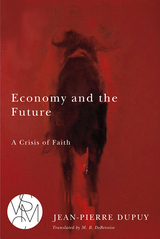 Economy and the Future: A Crisis of Faith
Jean-Pierre Dupuy
Michigan State University Press, 2014 A monster stalks the earth—a sluggish, craven, dumb beast that takes fright at the slightest noise and starts at the sight of its own shadow. This monster is the market. The shadow it fears is cast by a light that comes from the future: the Keynesian crisis of expectations. It is this same light that causes the world’s leaders to tremble before the beast. They tremble, Jean-Pierre Dupuy says, because they have lost faith in the future. What Dupuy calls Economy has degenerated today into a mad spectacle of unrestrained consumption and speculation. But in its positive form—a truly political economy in which politics, not economics, is predominant—Economy creates not only a sense of trust and confidence but also a belief in the open-endedness of the future without which capitalism cannot function. In this devastating and counterintuitive indictment of the hegemonic pretensions of neoclassical economic theory, Dupuy argues that the immutable and eternal decision of God has been replaced with the unpredictable and capricious judgment of the crowd. The future of mankind will therefore depend on whether it can see through the blindness of orthodox economic thinking.
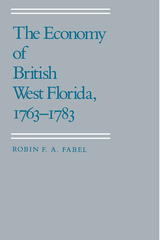 The Economy of British West Florida, 1763-1783
Robin F. A. Fabel
University of Alabama Press, 1988 "Highly recommended." —CHOICE This is the first book-length investigation of the economy of British West Florida and the extent to which it was economically viable given that it had been an economic failure for Spain. In it, author Robin Fabel explores both the territory's economy and history but also analyzes previously neglected but key aspects of British West Florida, including the maritime life of the province, the institution of slavery, and the potentially great immigration scheme sponsored by the Company of Military Adventures. The British divided Florida into two colonies: East Florida and West Florida. West Florida comprised the area between the Apalachicola, Chattahoochee, and Mississippi rivers, and from the Gulf of Mexico north to thirty-two degrees twenty-eight minutes north latitude, roughly the latitude of modern-day Jackson, MS and Montgomery, AL. In the geographic center of the colony were Mobile, Alabama and Pensacola, Floriday. British West Florida included parts of the states of Alabama, Florida, Louisiana, and Mississippi and existed from 1763 until 1783 at the end of the American Revolutionary War. Fabel contrasts the founding of Georgia, where slaves were initially excluded, with West Florida, where the slave trade became important economically. The British believed that only enslaved Blacks could labor successfully in the hot climate. Fabel gives an account of how owners employed enslaved people, how rare it was for slaves to be emancipated, and the passage of slave laws for West Florida. Fabel also explores British West Florida’s trade with Native Americans and the Caribbean islands, as well as the colony's relationships with neighboring Spanish and French communities. Fabel's work offers an engaging and accessible account of the history of an expansive region of colonial North America during a fluid period of colonial history before American independence.
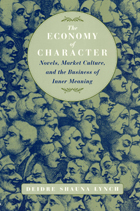 The Economy of Character: Novels, Market Culture, and the Business of Inner Meaning
Deidre Shauna Lynch
University of Chicago Press, 1998 At the start of the eighteenth century, talk of literary "characters" referred as much to letters and typefaces as it did to persons in books. Yet by the nineteenth century, characters had become the equals of their readers, friends with whom readers might spend time and empathize.
Although the story of this shift is usually told in terms of the "rise of the individual," Deidre Shauna Lynch proposes an ingenious alternative interpretation. Elaborating a "pragmatics of character," Lynch shows how readers used transactions with characters to accommodate themselves to newly commercialized social relations. Searching for the inner meanings of characters allowed readers both to plumb their own inwardness and to distinguish themselves from others. In a culture of mass consumption, argues Lynch, possessing a belief in the inexpressible interior life of a character rendered one's property truly private.
Ranging from Defoe and Smollett to Burney and Austen, Lynch's account will interest students of the novel, literary historians, and anyone concerned with the inner workings of consumer culture and the history of emotions.
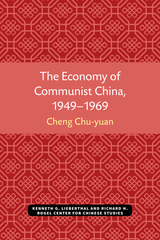 The Economy of Communist China, 1949–1969
Cheng Chu-yuan
University of Michigan Press, 1971 Economic development in mainland China during the first two decades of Communist control provides a typical example for the difficult task to transform a vast underdeveloped agrarian economy into a modern industrial one. In the first half of this period, a series of massive transformations of social and economic institutions was accompanied by a drafted industrialization program; the result was an impressive speed-up in economic growth. The second decade witnessed an economic crisis (1960–62) and a political upheaval (1966–68). These disruptions marred the economic performance over the period as a whole. Consequently, the long-term growth rate appears to have been only moderate. The Economy of Communist China reviews selected aspects of the economy. After examining the development strategy, it analyzes the quantitative trends and the structural changes. The book goes on to analyze the key factors contributing to the earlier growth and the elements responsible for the later disruption and finally assesses the impact of the Cultural Revolution on the Chinese economy and the prospects of the current Third Five-Year Plan. The text includes a bibliography of selected materials on Chinese economic development.
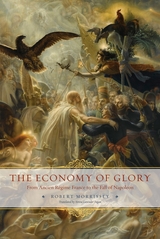 The Economy of Glory: From Ancien Régime France to the Fall of Napoleon
Robert Morrissey
University of Chicago Press, 2013 From the outset of Napoleon’s career, the charismatic Corsican was compared to mythic heroes of antiquity like Achilles, and even today he remains the apotheosis of French glory, a value deeply embedded in the country’s history. From this angle, the Napoleonic era can be viewed as the final chapter in the battle of the Ancients and Moderns. In this book, Robert Morrissey presents a literary and cultural history of glory and its development in France and explores the “economy of glory” Napoleon sought to implement in an attempt to heal the divide between the Old Regime and the Revolution.
Examining how Napoleon saw glory as a means of escaping the impasse of Revolutionary ideas of radical egalitarianism, Morrissey illustrates the challenge the leader faced in reconciling the antagonistic values of virtue and self-interest, heroism and equality. He reveals that the economy of glory was both egalitarian, creating the possibility of an aristocracy based on merit rather than wealth, and traditional, being deeply embedded in the history of aristocratic chivalry and the monarchy—making it the heart of Napoleon’s politics of fusion. Going beyond Napoleon, Morrissey considers how figures of French romanticism such as Chateaubriand, Balzac, and Hugo constantly reevaluated this legacy of glory and its consequences for modernity. Available for the first time in English, The Economy of Glory is a sophisticated and beautifully written addition to French history.
 The Economy of Modern Israel: Malaise and Promise
Assaf Razin and Efraim Sadka
University of Chicago Press, 1993 In this up-to-date study of the Israeli economy, Assaf Razin and Efraim Sadka cover the entire economic history of the state, focusing on links between Israel's economic growth, its integration into world markets, its tax and welfare systems, and the political conflicts in the Middle East.
The authors present the first detailed economic analysis of the Palestinian uprising, showing how the unrest has led to a fall in Arab employment in Israel and serious economic loss to the occupied territories with some loss to Israel. They also examine how the uprising has affected Israel's financial standing internationally and the inflow of foreign aid.
Razin and Sadka see promise for Israel's economy in the waves of immigration from the former Soviet Union, despite the current difficulties in absorbing the immigrants; in the coexistence of a flourishing and highly competitive private sector with a relatively large public sector, which is undergoing privatization; and in a tax structure that encourages long-term saving and business growth. By examining the interplay between the exchange rate, interest rates, and monetary and anti-inflation policies, the authors investigate the possibilities for renewed growth and conclude that the future of Israel's economy crucially depends on serious efforts to secure peace in the Middle East.
 The Economy of Prestige: Prizes, Awards, and the Circulation of Cultural Value
James F. English
Harvard University Press, 2008 This is a book about one of the great untold stories of modern cultural life: the remarkable ascendancy of prizes in literature and the arts. Such prizes and the competitions they crown are almost as old as the arts themselves, but their number and power--and their consequences for society and culture at large--have expanded to an unprecedented degree in our day. In a wide-ranging overview of this phenomenon, James F. English documents the dramatic rise of the awards industry and its complex role within what he describes as an economy of cultural prestige.
Observing that cultural prizes in their modern form originate at the turn of the twentieth century with the institutional convergence of art and competitive spectator sports, English argues that they have in recent decades undergone an important shift--a more genuine and far-reaching globalization than what has occurred in the economy of material goods. Focusing on the cultural prize in its contemporary form, his book addresses itself broadly to the economic dimensions of culture, to the rules or logic of exchange in the market for what has come to be called "cultural capital." In the wild proliferation of prizes, English finds a key to transformations in the cultural field as a whole. And in the specific workings of prizes, their elaborate mechanics of nomination and election, presentation and acceptance, sponsorship, publicity, and scandal, he uncovers evidence of the new arrangements and relationships that have refigured that field.
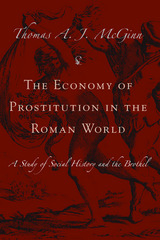 The Economy of Prostitution in the Roman World: A Study of Social History and the Brothel
Thomas A. J. McGinn
University of Michigan Press, 2004
In recent years, a number of classical scholars have turned their attention to prostitution in the ancient world. Close examination of the social and legal position of Roman meretrices and Greek hetairai have enriched our understanding of ancient sexual relationships and the status of women in these societies. These studies have focused, however, almost exclusively on the legal and literary evidence.
McGinn approaches the issues from a new direction, by studying the physical venues that existed for the sale of sex, in the context of the Roman economy. Combining textual and material evidence, he provides a detailed study of Roman brothels and other venues of venal sex (from imperial palaces and privates houses to taverns, circuses, and back alleys) focusing on their forms, functions, and urban locations.
The book covers the central period of Roman history, roughly from 200 B.C. to A.D. 250. It will especially interest social and legal historians of the ancient world, and students of gender, sexuality, and the family.
Thomas A. J. McGinn is Associate Professor of Classical Studies at Vanderbilt University.
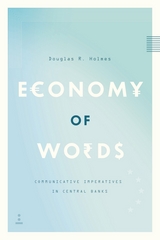 Economy of Words: Communicative Imperatives in Central Banks
Douglas R. Holmes
University of Chicago Press, 2013 Markets are artifacts of language—so Douglas R. Holmes argues in this deeply researched look at central banks and the people who run them. Working at the intersection of anthropology, linguistics, and economics, he shows how central bankers have been engaging in communicative experiments that predate the financial crisis and continue to be refined amid its unfolding turmoil—experiments that do not merely describe the economy, but actually create its distinctive features.
Holmes examines the New York District Branch of the Federal Reserve, the European Central Bank, Deutsche Bundesbank, and the Bank of England, among others, and shows how officials there have created a new monetary regime that relies on collaboration with the public to achieve the ends of monetary policy. Central bankers, Holmes argues, have shifted the conceptual anchor of monetary affairs away from standards such as gold or fixed exchange rates and toward an evolving relationship with the public, one rooted in sentiments and expectations. Going behind closed doors to reveal the intellectual world of central banks,Economy of Words offers provocative new insights into the way our economic circumstances are conceptualized and ultimately managed.
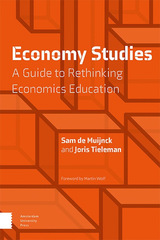 Economy Studies: A Guide to Rethinking Economics Education
Sam de Muijnck
Amsterdam University Press, 2022 The Economy Studies project emerged from the worldwide movement to modernise economics education, spurred on by the global financial crisis of 2008, the climate crisis, and the COVID-19 pandemic. It envisions a wide variety of economics graduates and specialists, equipped with a broad toolkit, enabling them to collectively understand and help tackle the issues the world faces today.
This is a practical guide for (re-)designing economics courses and programs. Based on a clear conceptual framework and ten flexible building blocks, this handbook offers refreshing ideas and practical suggestions to stimulate student engagement and critical thinking across a wide range of courses.
Key features are:
- Adapting Existing Courses: Plug-and-play suggestions to improve existing economics courses with attention to institutions, history, values and practical skills.
- Teaching materials: A guide through the rapidly growing range of innovative textbooks and other teaching materials.
- Example Courses and Curricula: How to design pluralist, real-world economics education within the practical limits of time and resources.
The companion website, www.economystudies.com, contains a wealth of additional resources, such as tailor-made booklets for more specific audiences, additional teaching materials and links to plug-and-play syllabi and courses, and opportunities for workshops and exchange with other economics educators.
 Econophonia: Music, Value, and Forms of Life
Gavin Steingo and Jairo Moreno, special issue editors
Duke University Press This issue theorizes what questions of value might contribute to our understanding of sound and music. Divesting sound and music from notions of intrinsic value, the contributors follow various avenues through which sound and music produce value in and as history, politics, ethics, epistemology, and ontology. As a result, the very question of what sound and music are—what constitutes them, as well as what they constitute—is at stake. Contributors examine the politics of music and crowds, the metaphysics of sensation, the ecological turn in music studies, and the political resistance inherent to sound; connect Karl Marx to black music and slave labor; look at Marx, the Marx Brothers, and fetishism; and explore the tension between the voice of the Worker who confronts Capital head-on and the voices of actual workers. Contributors: Amy Cimini, Bill Dietz, Jairo Moreno, Rosalind Morris, Ana María Ochoa Gautier, Ronald Radano, Gavin Steingo, Peter Szendy, Gary Tomlinson, Naomi Waltham-Smith
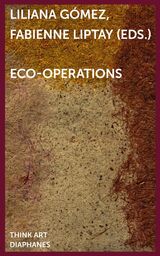 eco-operations
Edited by Fabienne Liptay and Liliana Gómez
Diaphanes, 2024 An edited collection of contributions to conversations about the climate crisis and its role in critical discourse.
The climate change crisis has become part of aesthetic discourse and critical research in culture and the arts. Future-oriented, ecologically conceived possibilities for action are being explored by artists, curators, and scholars alike. eco-operations addresses these emerging aesthetic ecologies and new technologies of cooperation that both challenge and shape a sustainable future, foregrounding interruptions, ruptures, disconnections, dissonances, exclusions, and allochronism. Moving beyond the concepts of “flow” and “network” as a single, coherent (ecological or technological) system, eco-operations instead emphasizes the frictions within asynchronously running systems. The infrastructures and formats of artistic production and exhibition play a central role here, as they themselves constitute ecosystems that invite and regulate processes of sharing and exchange. Artists and activists are embedded in these ecosystems, in which they simultaneously intervene when searching for alternative ways of creating collaborative practice. Bringing together scholars, artists, writers, and curators, and working across a range of disciplines, eco-operations explores this field of tension between global and local ecologies and aims to speculate on where dissonances imply both creative potential and political challenges.
eco-operations features contributions by Dalida María Benfield, Ursula Biemann, Lisa Blackmore, Mateo Chacón Pino, Lucrezia Cippitelli, T. J. Demos, Sandra Frimmel, Laura Flórez, Lorena Cely, Alexandra Gelis, Liliana Gómez, Fabienne Liptay, Uriel Orlow, and Dorota Sajewska.
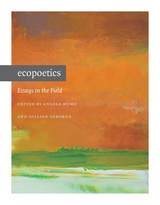 Ecopoetics: Essays in the Field
Angela Hume and Gillian Osborne
University of Iowa Press, 2018 Ecopoetics: Essays in the Field makes a formidable intervention into the emerging field of ecopoetics. The volume’s essays model new and provocative methods for reading twentieth and twenty-first century ecological poetry and poetics, drawing on the insights of ecocriticism, contemporary philosophy, gender and sexuality studies, black studies, Native studies, critical race theory, and disability studies, among others. Contributors offer readings of a diverse range of poets, few of whom have previously been read as nature writers—from midcentury Beat poet Michael McClure, Objectivist poet George Oppen, and African American poets Melvin Tolson and Robert Hayden; to contemporary writers such as Diné poet Sherwin Bitsui, hybrid/ collage poets Claudia Rankine and Evelyn Reilly, emerging QPOC poet Xandria Phillips, and members of the Olimpias disability culture artists’ collective. While addressing preconceptions about the categories of nature writing and ecopoetics, contributors explore, challenge, and reimagine concepts that have been central to environmental discourse, from apocalypse and embodiment to toxicity and sustainability. This collection of essays makes the compelling argument that ecopoetics should be read as “coextensive with post-1945 poetry and poetics,” rather than as a subgenre or movement within it. It is essential reading for any student or scholar working on contemporary literature or in the environmental humanities today.
Contributors: Joshua Bennett, Rob Halpern, Matt Hooley, Angela Hume, Lynn Keller, Petra Kuppers, Michelle Niemann, Gillian Osborne, Samia Rahimtoola, Joan Retallack, Joshua Schuster, Jonathan Skinner.
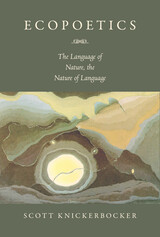 Ecopoetics: The Language of Nature, the Nature of Language
Scott Knickerbocker
University of Massachusetts Press, 2012 Ecocritics and other literary scholars interested in the environment have tended to examine writings that pertain directly to nature and to focus on subject matter more than expression. In this book, Scott Knickerbocker argues that it is time for the next step in ecocriticism: scholars need to explore the figurative and aural capacity of language to evoke the natural world in powerful ways.
Ecopoetics probes the complex relationship between artifice and the natural world in the work of modern American poets—in particular Wallace Stevens, Elizabeth Bishop, Richard Wilbur, and Sylvia Plath. These poets relate to nature as a deep wellspring of meaning, although they all avoid using language the way most nature writers do, merely to reflect or refer directly to the world. Each of these poets, in his or her own distinct way, employs instead what Knickerbocker terms sensuous poesis, the process of rematerializing language through sound effects and other formal devices as a sophisticated response to nonhuman nature.
Rather than attempt to erase the artifice of their own poems, to make them seem more natural and thus supposedly closer to nature, the poets in this book unapologetically embrace artifice—not for its own sake but in order to perform and enact the natural world. Indeed, for them, artifice is natural. In examining their work, Knickerbocker charts a new direction for ecocriticism.
Ecopoetry: Critical Introduction
Scott Bryson
University of Utah Press, 2002 The burgeoning field of ecocriticism is beginning to address the work of such ecopoets as Gary Snyder, Mary Oliver, W. S. Merwin, and Wendell Berry, among others, whose poems increasingly deal with ecological and environmental issues. Ecopoetry: A Critical Introduction assembles previously unpublished contributions from many of the most important scholars in the field as they discuss the historical and crosscultural roots of ecopoetry, while expanding the boundaries to include such themes as genocide and extinction, the lesbian body, and post colonialism. This volume gathers these necessary voices in the emerging conversation regarding poetry’s place in the environmental debate.
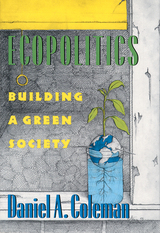 Ecopolitics: Building a Green Society
Coleman, Daniel
Rutgers University Press, 1994 Where do you place the blame for the environmental crisis-too many people? consumer greed? technology gone amok? And what do you think will save our planet-birth control? appropriate technology? recycling? eco-consumerism?
Those solutions are just "Band-Aids on a bleeding Earth," argues environmental activist Daniel A. Coleman. Where conventional wisdom sees both the cause of the environmental crisis and its cure in individual actions, Coleman says: Look again. By blaming ourselves as individuals, we let governments and corporations off the hook. Making "50 simple" changes in our personal lifestyles is worthwhile, but must not divert our attention from the underlying causes of environmental disaster. The real causes are rooted deep in the politics of human affairs-and so are their solutions.We should be asking: Why do we allow such harm to our environment? How did we create a society with no stake in the future? How can we build a green society?
The good news is that we can reverse the process of environmental abuse. Political strategies driven by the key values of ecological responsibility, participatory democracy, environmental justice, and community action are effective. Dan Coleman's stories of citizen groups whose grassroots organizing has already put ecologically sound policies in place demonstrate that the sustainable society is indeed possible.
Lucid, lively, probing, serious, yet optimistic-Coleman's analysis is required reading for all who count the earth as their home.
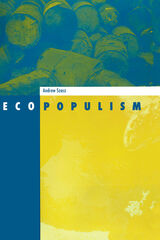 Ecopopulism: Toxic Waste and the Movement for Environmental Justice
Andrew Szasz
University of Minnesota Press, 1994 Moment by moment the evidence mounts that unchecked modern industry is bringing us ever closer to environmental disaster. How can we move away from the brink of extinction, toward a human society the earth can bear? In the thriving popular politics of hazardous waste, Andrew Szasz finds an answer, a scenario for taking the most pressing environmental issues out of the academy and the boardroom and turning them into everyone's business. This book reconstructs the growth of a powerful movement around the question of toxic waste. Szasz follows the issue as it moves from the world of "official" policymaking in Washington, onto the nation's television screens and into popular consciousness, and then into America's neighborhoods, spurring the formation of thousands of local, community-based groups. He shows how, in less than a decade, a rich infrastructure of more permanent social organizations emerged from this movement, expanding its focus to include issues like municipal waste, military toxics, and pesticides. In the growth of this movement, we witness the birth of a radical environmental populism. Here Szasz identifies the force that pushed environmental policy away from the traditional approach, pollution removal, toward the superior logic of pollution prevention. He discusses the conflicting official responses to the movement's evolution, revealing that, despite initial resistance, lawmakers eventually sought to appease popular discontent by strengthening toxic waste laws. In its success, Szasz suggests, this movement may even prove to be the vehicle for reinvigorating progressive politics in the United States.
Eco-pragmatism: Making Sensible Environmental Decisions in an Uncertain World
Daniel A. Farber
University of Chicago Press, 1999 Eco-pragmatism takes on the most critical controversies in environmental law today: how to weigh economic costs against environmental quality and human life, how to assess the long time horizons of environmental problems, and how to make appropriate decisions in the face of scientific uncertainty about the scope of environmental problems.
"A comprehensive well-argued effort to address many of the most difficult issues facing legislators concerned with environmental issues."—Stephen P. Adamian, Boston Book Review
"A timely and well-argued contribution."—Calestous Juma, Nature
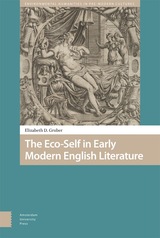 The Eco-Self in Early Modern English Literature
Elizabeth Gruber
Amsterdam University Press, 2023 The Eco-Self in Early Modern English Literature tracks an important shift in early modern conceptions of selfhood, arguing that the period hosted the birth of a new subset of the human, the eco-self, which melds a deeply introspective turn with an abiding sense of humans’ embedment in the world. A confluence of cultural factors produced the relevant changes. Of paramount significance was the rapid spread of literacy in England and across Europe: reading transformed the relationship between self and world, retooled moral reasoning, and even altered human anatomy. This book pursues the salutary possibilities, including the ecological benefits, of this redesigned self by advancing fresh readings of texts by William Shakespeare, Christopher Marlowe, John Webster, and Margaret Cavendish. The eco-self offers certain refinements to ecological theory by renewing appreciation for the rational, deliberative functions that distinguish humans from other species.
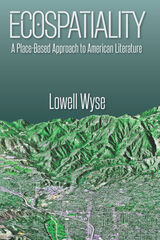 Ecospatiality: A Place-Based Approach to American Literature
Lowell Wyse
University of Iowa Press, 2021 Ecospatiality explores modern and contemporary American prose literature through the lens of place, showing how authors like William Least Heat-Moon, Willa Cather, Richard Wright, and Leslie Marmon Silko represent and reimagine real places in the world and the human-environment relationships therein. Building on the work of scholars in geography, sociology, ecocriticism, and geocriticism, this book articulates the theory of ecospatiality: an understanding of place as simultaneously spatial, ecological, and historical. In our current historical moment, which is characterized by ongoing ecological collapse and a not-unrelated increase in social disorder, few issues are more urgent than the human relationship with our environments. Whether we characterize this new epoch as the climate change era or the Anthropocene, we can no longer ignore the fact that the places we live are rapidly changing in response to economic and environmental pressures. Rather than thinking of place as a neutral site for social interaction, we should recognize how it underpins and intertwines with human experience. Fortunately, literature can help us think through how place operates. Lowell Wyse shows that texts can be understood as works of literary cartography. Focusing on works of nonfiction and fiction whose primary settings are on the North American continent, Ecospatiality demonstrates how these narratives rely on realistic literary geography to invoke, and sometimes retell, important aspects of environmental history within particular communities and bioregions.
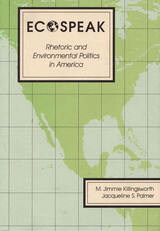 Ecospeak: Rhetoric and Environmental Politics in America
M. Jimmie Killingsworth and Jacqueline S. Palmer
Southern Illinois University Press, 1992 In this book, M. Jimmie Killingsworth and Jacqueline S. Palmer have a twofold purpose: to analyze the patterns of rhetoric used in written discourse about environmental politics and to make a practical contribution to the art of rhetorical criticism through the study of rhetoric in use. The language, professional objectivity, and research programs of scientists insulate these best-informed citizens in enclaves of specialization, limiting access to crucial information and hindering effective reformative action. Science, the authors stress, is not merely a database to rely upon but a view of the world that must be broadened in order to affect social morality. Science-based activism must arise to ensure the care and future of the environment. Killingsworth and Palmer argue that for grassroots activism to be tied to this globally conscious philosophy, a rhetoric of sustainability must be cultivated.
 Ecosublime: Environmental Awe and Terror from New World to Oddworld
Lee Rozelle
University of Alabama Press, 2006 Explores 19th-century, modern, postmodern, and millennial texts as they portray the changing ecological face of America
Lee Rozelle probes the metaphor of environmental catastrophe in American literature of the last 150 years. In each instance, Rozelle finds evidence that the ecosublime--nature experienced as an instance of wonder and fear--profoundly reflects spiritual and political responses to the natural world, America’s increasingly anti-ecological trajectory, and the ascendance of a post-natural landscape.
In the 19th century, Rozelle argues, Isabella Bird and Edgar Allan Poe represented the western wilderness as culturally constructed and idealized landscapes. Gardens, forests, and frontiers are conceptual frameworks that either misrepresent or uphold ecological space. Modernists like Nathanael West and William Carlos Williams, on the other hand, portray urban space as either wastelands or mythical urban gardens. A chapter on Charles W. Chesnutt and Rebecca Harding Davis analyzes a new breed of literary eco-advocate, educating and shocking mainstream readers through depictions of ecological disaster. A later chapter probes the writings of Edward Abbey and the Unabomber Manifesto to delve into the sublime dimensions of environmental activism, monkey-wrenching, and eco-terrorism.
Eco-Sufficiency and Global Justice: Women Write Political Ecology
Edited by Ariel Salleh
Pluto Press, 2009 As the twenty-first century faces a crisis of democracy and sustainability, this book attempts to bring academics and alternative globalisation activists into conversation.
Through studies of global neoliberalism, ecological debt, climate change, and the ongoing devaluation of reproductive and subsistence labour, these uncompromising essays by internationally distinguished women thinkers expose the limits of current scholarship in political economy, ecological economics, and sustainability science.
The book introduces groundbreaking theoretical concepts for talking about humanity-nature links and will be a challenging read for activists and for students of political economy, environmental ethics, global studies, sociology, women's studies, and critical geography.
 Ecosystem Management: Adaptive, Community-Based Conservation
Gary K. Meffe, Larry A. Nielsen, Richard L. Knight, and Dennis A. Schenborn
Island Press, 2002 Today's natural resource managers must be able to navigate among the complicated interactions and conflicting interests of diverse stakeholders and decisionmakers. Technical and scientific knowledge, though necessary, are not sufficient. Science is merely one component in a multifaceted world of decision making. And while the demands of resource management have changed greatly, natural resource education and textbooks have not. Until now. Ecosystem Management represents a different kind of textbook for a different kind of course. It offers a new and exciting approach that engages students in active problem solving by using detailed landscape scenarios that reflect the complex issues and conflicting interests that face today's resource managers and scientists. Focusing on the application of the sciences of ecology and conservation biology to real-world concerns, it emphasizes the intricate ecological, socioeconomic, and institutional matrix in which natural resource management functions, and illustrates how to be more effective in that challenging arena. Each chapter is rich with exercises to help facilitate problem-based learning. The main text is supplemented by boxes and figures that provide examples, perspectives, definitions, summaries, and learning tools, along with a variety of essays written by practitioners with on-the-ground experience in applying the principles of ecosystem management. Accompanying the textbook is an instructor's manual that provides a detailed overview of the book and specific guidance on designing a course around it. Download the manual here. Ecosystem Management grew out of a training course developed and presented by the authors for the U.S. Fish and Wildlife Service at its National Training Center in Shepherdstown, West Virginia. In 20 offerings to more than 600 natural resource professionals, the authors learned a great deal about what is needed to function successfully as a professional resource manager. The book offers important insights and a unique perspective dervied from that invaluable experience.
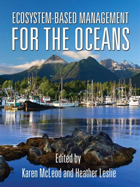 Ecosystem-Based Management for the Oceans
Edited by Karen McLeod and Heather Leslie
Island Press, 2009 Conventional management approaches cannot meet the challenges faced by ocean and coastal ecosystems today. Consequently, national and international bodies have called for a shift toward more comprehensive ecosystem-based marine management. Synthesizing a vast amount of current knowledge, Ecosystem-Based Management for the Oceans is a comprehensive guide to utilizing this promising new approach.
At its core, ecosystem-based management (EBM) is about acknowledging connections. Instead of focusing on the impacts of single activities on the delivery of individual ecosystem services, EBM focuses on the array of services that we receive from marine systems, the interactive and cumulative effects of multiple human activities on these coupled ecological and social systems, and the importance of working towards common goals across sectors. Ecosystem-Based Management for the Oceans provides a conceptual framework for students and professionals who want to understand and utilize this powerful approach. And it employs case studies that draw on the experiences of EBM practitioners to demonstrate how EBM principles can be applied to real-world problems.
The book emphasizes the importance of understanding the factors that contribute to social and ecological resilience —the extent to which a system can maintain its structure, function, and identity in the face of disturbance. Utilizing the resilience framework, professionals can better predict how systems will respond to a variety of disturbances, as well as to a range of management alternatives. Ecosystem-Based Management for the Oceans presents the latest science of resilience, while it provides tools for the design and implementation of responsive EBM solutions.
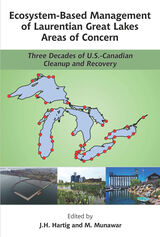 Ecosystem-Based Management of Laurentian Great Lakes Areas of Concern: Three Decades of U.S. - Canadian Cleanup and Recovery
John H. Hartig
Michigan State University Press, 2021 This installment of the Ecovision World Monograph Series provides an in-depth look at the remediation and restoration of the forty-three most polluted areas of the Great Lakes, which are designated Areas of Concern (AOCs). This restoration effort, a collaboration between Canada and the United States, is unique in that it has fostered the use of locally designed ecosystem approaches to restoring impaired beneficial uses, as called for in the Canada-U.S. Great Lakes Water Quality Agreement. In total, thirty-seven Canadian and U.S. scientists contributed to this comprehensive evaluation of what has been achieved and learned from more than three decades of remediation and restoration efforts. This monograph will be an excellent resource to researchers, resource managers, university faculty, and students in the Great Lakes Basin Ecosystem, as well as for those interested in restoring degraded aquatic ecosystems throughout the world. No other monograph or text book provides such a comprehensive evaluation of AOCs. A foreword is provided by Dr. Diane Saxe, former Environmental Commissioner of Ontario. Leading primary contributors include J. Hartig, M. Munawar, L. Richman, S. Pickard, M. Tuchman, R. Stewart, J. Ridgeway, R. Sherman, N. French, K. Williams, G. Krantzberg, and C. McLaughlin.
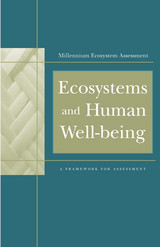 Ecosystems and Human Well-Being: A Framework For Assessment
Millennium Ecosystem Assessment
Island Press, 2003 Ecosystems and Human Well-being is the first product of the Millennium Ecosystem Assessment (MA), a four-year international work program designed to meet the needs of decision-makers for scientific information on the links between ecosystem change and human well-being. The Millennium Ecosystem Assessment is modeled on the Intergovernmental Panel on Climate Change (IPCC) and will provide information requested by governments, through four international conventions, as well as meeting needs within the private sector and civil society. Ecosystems and Human Well-being offers an overview of the assessment, describing the conceptual framework that is being used, defining its scope and providing a baseline of understanding that all participants need to move forward. The Millennium Ecosystem Assessment focuses on how humans have altered ecosystems, and how changes in ecosystems have affected human well-being. The assessment also evaluates how ecosystem changes may affect people in future decades and what responses can be adopted at local, national, or global scales to improve ecosystem management and thereby contribute to human well-being and poverty alleviation. The assessment was launched by United Nations Secretary-General Kofi Annan in June 2001, and the primary assessment reports will be released by Island Press in 2005. The Millennium Ecosystem Assessment series is an invaluable new resource for professionals and policy-makers concerned with international development, environmental science, environmental policy, and related fields. It will help both in choosing among existing options and in identifying new approaches for achieving integrated management of land, water, and living resources while strengthening regional, national, and local capacities. The Millennium Ecosystem Assessment series will also improve policy and decision-making at all levels by increasing collaboration between natural and social scientists, and between scientists and policy-makers. Ecosystems and Human Well-being is an essential introduction to the program.
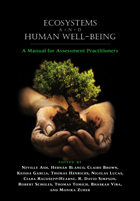 Ecosystems and Human Well-Being: A Manual for Assessment Practitioners
Neville Ash, Hernán Blanco, Claire Brown, Keisha Garcia, Thomas Henrichs, Nicolas Lucas, Ciara Raudsepp-Hearne, R. David Simpson, Robert Scholes, Thomas P. Tomich, Bhaskar Vira, Monika Zurek
Island Press, 2010 Designed by a partnership of UN agencies, international scientific organizations, and development agencies, the Millennium Ecosystem Assessment (MA) is the most extensive study ever of the linkages between the world’s ecosystems and human well-being. The goal of the MA is to establish the scientific basis for actions needed to enhance the contribution of ecosystems to human well-being without undermining their long-term productivity. With contributions by more than 500 scientists from 70 countries, the MA has proven to be one of the most important conservation initiatives ever undertaken, and the ecosystem services paradigm on which it is based provides the standard for practice. This manual supplies the specific tools that practitioners of the paradigm need in order to extend their work into the future.
The manual is a stand-alone “how to” guide to conducting assessments of the impacts on humans of ecosystem changes. In addition, assessment practitioners who are looking for guidance on particular aspects of the assessment process will find individual chapters of this manual to be useful in advancing their understanding of best practices in ecosystem assessment. The manual builds on the experiences and lessons learned from the Millennium Ecosystem Assessment global and sub-global assessment initiatives, with chapters written by well-known participants in those initiatives. It also includes insights and experiences gained from a wider range of ecosystem service-focused assessment activities since the completion of the MA in 2005.
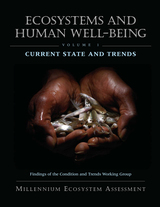 Ecosystems and Human Well-Being: Current State and Trends: Findings of the Condition and Trends Working Group
Millennium Ecosystem Assessment
Island Press, 2005 Humans have changed ecosystems more rapidly and extensively in the last 50 years than in any comparable period of human history. We have done this to meet the growing demands for food, fresh water, timber, fiber, and fuel. While changes to ecosystems have enhanced the well-being of billions of people, they have also caused a substantial and largely irreversible loss in diversity of life on Earth, and have strained the capacity of ecosystems to continue providing critical services.
Among the findings:
Approximately 60% of the services that support life on Earth are being degraded or used unsustainably. The harmful consequences of this degradation could grow significantly worse in the next 50 years.
Only four ecosystem services have been enhanced in the last 50 years: crops, livestock, aquaculture, and the sequestration of carbon.
The capacity of ecosystems to neutralize pollutants, protect us from natural disasters, and control the outbreaks of pests and diseases is declining significantly.
Terrestrial and freshwater systems are reaching the limits of their ability to absorb nitrogen.
Harvesting of fish and other resources from coastal and marine systems is compromising their ability to deliver food in the future.
Richly illustrated with maps and graphs, Current State and Trends presents an assessment of Earth's ability to provide twenty-four distinct services essential to human well-being. These include food, fiber, and other materials; the regulation of the climate and fresh water systems; underlying support systems such as nutrient cycling; and the fulfillment of cultural, spiritual, and aesthetic values. The volume pays particular attention to the current health of key ecosystems, including inland waters, forests, oceans, croplands, and dryland systems, among others. It will be an indispensable reference for scientists, environmentalists, agency professionals, and students.
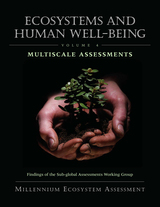 Ecosystems and Human Well-Being: Multiscale Assessments: Findings of the Sub-Global Assessments Working Group
Millennium Ecosystem Assessment
Island Press, 2005 One of the major innovations of the Millennium Ecosystem Assessment is the incorporation of local and regional assessmentsù33 in allùin a global portrait of the planetÆs health. It is the first global assessment of ecosystems to include not only a diversity of ecosystems, but to draw on a wide range of cultural orientations and intellectual traditions, including those of indigenous peoples.
The Sub-global Assessments Working Group integrated information from multiple sources and found that biophysical factors such as land-use change, climate change and variability, pollution, and invasive species have a significant effect on human well-being across cultures. For example, in places where there are no other social safety nets, diminished human well-being tends to increase immediate dependence on ecosystem services, which can damage the capacity of those local ecosystems, which in turn appears to increase the probability of natural disaster or conflict.
Representing the baseline and framework for ongoing assessments of ecosystem and human well-being on a variety of scales around the world, Multiscale Assessments provides students, researchers, and policy-makers with the most comprehensive methodology for assessing ecosystems at local, national, and regional scales.
Ecosystems and Human Well-Being: Our Human Planet: Summary for Decision Makers
Millennium Ecosystem Assessment
Island Press, 2005 Our Human Planet summarizes the findings of the four working groups and serves as a reference guide to the four main volumes in the MA series. It presents the key findings of each of the working groups, providing an overview of the framework used by the assessment, and will serve as a guide for assessment, planning, and management for the future.
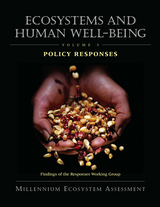 Ecosystems and Human Well-Being: Policy Responses: Findings of the Responses Working Group
Millennium Ecosystem Assessment
Island Press, 2005 With the knowledge of possible outcomes, what kind of actions should we take? The Millennium Ecosystem Assessment scored 74 response options for dealing with declines in ecosystem services and biodiversity, and managing drivers such as climate change and nutrient loading. This third volume in the MA series analyzes the track record of past policies and the potential of new ones.
The challenge of reversing the degradation of ecosystems while meeting increasing demands for their services can be met only with significant policy and institutional changes. However, a difficult set of obstacles stand in the way. Policy makers must keep in mind that there are both trade-offs and synergies between human well-being, ecosystems, and ecosystem services, and that decisions regarding these tradeoffs are difficult and often contentious. The Responses volume ultimately establishes which policy options have the greatest chance to overcome the obstacles and generate positive outcomes. It will serve as an invaluable guide to the creation of stronger policy frameworks for the future.
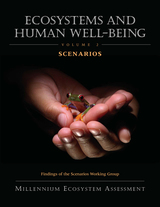 Ecosystems and Human Well-Being: Scenarios: Findings of the Scenarios Working Group
Millennium Ecosystem Assessment
Island Press, 2005 Scenarios are an invaluable tool for analyzing complex systems and understanding possible outcomes. This second volume of the MA series explores the implications of four different approaches for managing ecosystem services in the face of growing human demand for them:
The Global Orchestration approach, in which we emphasize equity, economic growth, and public goods, reacting to ecosystem problems when they reach critical stages.
Order from Strength, which emphasizes security and economic growth.
Adapting Mosaic, which emphasizes proactive management of ecosystems, local adaptation, and flexible governance.
TechnoGarden, a globalized approach with an emphasis on green technology and a proactive approach to managing ecosystems.
The Scenarios volume will help decision-makers and managers identify development paths that better maintain the resilience of ecosystems, and can reduce the risk of damage to human well-being and the environment.
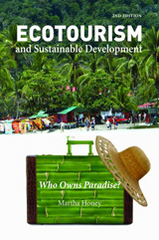 Ecotourism and Sustainable Development, Second Edition: Who Owns Paradise?
Martha Honey
Island Press, 2008 Around the world, ecotourism has been hailed as a panacea: a way to fund conservation and scientific research, protect fragile ecosystems, benefit communities, promote development in poor countries, instill environmental awareness and a social conscience in the travel industry, satisfy and educate discriminating tourists, and, some claim, foster world peace. Although “green” travel is being aggressively marketed as a “win-win” solution for the Third World, the environment, the tourist, and the travel industry, the reality is far more complex, as Martha Honey reports in this extraordinarily enlightening book.
Ecotourism and Sustainable Development, originally published in 1998, was among the first books on the subject. For years it has defined the debate on ecotourism: Is it possible for developing nations to benefit economically from tourism while simultaneously helping to preserve pristine environments? This long-awaited second edition provides new answers to this vital question.
Ecotourism and Sustainable Development is the most comprehensive overview of worldwide ecotourism available today, showing how both the concept and the reality have evolved over more than twenty-five years. Here Honey revisits six nations she profiled in the first edition—the Galapagos Islands, Costa Rica, Tanzania, Zanzibar, Kenya, and South Africa—and adds a fascinating new chapter on the United States. She examines the growth of ecotourism within each country’s tourism strategy, its political system, and its changing economic policies. Her useful case studies highlight the economic and cultural impacts of expanding tourism on indigenous populations as well as on ecosystems.
Honey is not a “travel writer.” She is an award-winning journalist and reporter who lived in East Africa and Central America for nearly twenty years. Since writing the first edition of this book, she has led the International Ecotourism Society and founded a new center to lead the way to responsible ecotourism. Her experience and her expertise resonate throughout this beautifully written and highly informative book.
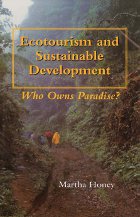 Ecotourism and Sustainable Development: Who Owns Paradise?
Martha Honey
Island Press, 1999 Ecotourism is defined as "responsible travel to natural areas which conserves the environment and improves the welfare of local people." Many see it as a panacea for developing nations -- a source of clean development that can bring wealth to rural communities while simultaneously helping to preserve pristine environments. But has the reality lived up to the promise? And is that even possible.In Ecotourism and Sustainable Development, Martha Honey presents an overview of the ecotourism industry and a first-hand account of ecotourism projects around the world. Based on interviews and visits to ecotourist hotspots in Latin America and Africa, she offers a vivid description and analysis of projects that meet the goals and standards of ecotourism as well as those that claim to be ecotourism but in reality fall short. She presents in-depth case studies of seven destinations (Galapagos, Costa Rica, Cuba, Zanzibar, Tanzania, Kenya, and South Africa) that serve to illustrate the real world of ecotourism. For each, she offers an ecotourism scorecard, grading it on its adherence to the enumerated principles of ecotourism and sustainable development.Honey addresses topics such as the evolution and principles of ecotourism, where profits go, and the mechanics and politics of the tourist industry as a whole. The case studies highlight the economic and cultural impacts of tourism development on indigenous populations as well as on ecosystems. Honey also surveys current thinking and policies of environmental groups, and looks at how political situations, human rights records, and natural resource management influence travel decisions.Ecotourism and Sustainable Development provides a unique and compelling look at the promise and pitfalls of ecotourism. It is the only such account of worldwide ecotourism available today, and is an important guide for students and researchers involved with international development, geography, or tourism, as well as for anyone interested in becoming a more environmentally sensitive traveller.
 Ecoviews: Snakes, Snails, and Environmental Tales
Whit Gibbons and Anne R. Gibbons
University of Alabama Press, 1998 The authors offer a fun-to-read perspective on natural history, ecology as a field of study, and the current environmental issues that face our communities and the world. This lively and entertaining book provides a fascinating and thought-provoking look at the ecology of animals, plants, and their habitats and promotes awareness of pressing environmental issues. The eight informative chapters deliver effective environmental messages and supply compelling insight into the natural world and the ecologists who investigate its many mysteries. From a concerned ecological stance, the authors show that human relationship with other organisms and the environment is always complex and can be exhilarating, inspiring, humorous, and irritating, depending on perspectives and circumstances. Writing truly to inform and delight, they give a captivating variety of examples from the natural world in hopes of making readers of all ages more compassionate, more tolerant, and more sensitive to other living organisms and their interrelationships. The book celebrates the intrinsic worth of all plants and animals in order to motivate people in a unified effort to preserve the Earth's rich array of life forms. The preservation of the integrity of our planet's biodiversity is, the authors illustrate, critical to our own survival.
 Ecoviews Too: Ecology for All Seasons
Whit Gibbons and Anne R. Gibbons
University of Alabama Press, 2017 Ecoviews Too examines various human attitudes toward wildlife and the environment, focusing on seasonal occurrences and natural adaptations, in an engaging and informative manner.
Whit Gibbons and Anne R. Gibbons’s Ecoviews Too: Ecology for All Seasons is based on the popular weekly column “Ecoviews,” published by numerous newspapers for more than thirty years. A follow-up to Ecoviews: Snakes, Snails and Environmental Tales, this lively and entertaining book provides a fascinating and thought-provoking look at the ecology of animals, plants, and their habitats, and promotes awareness of pressing environmental issues.
Because nature, in all its myriad and amazing manifestations, can be enjoyed all year round, this collection is conveniently divided into four sections paralleling the seasons and tracking the adaptations and responses of wildlife to the relentless changes that occur at any location over time. The ecological vignettes focus on seasonal happenings in the cycle of life. The authors not only draw parallels between the natural world and human activities but also highlight unique behaviors of various plant and animal species. They often use humor to get across their message regarding the need to protect our native species and the habitats they depend on for survival.
An intriguing and captivating publication, Ecoviews Too is comprised of fifty informative essays that address ecological topics such as camouflage and mimicry, hibernation and estivation, the human need to encounter scary animals, the mysteries of plant dormancy in winter, the comeback of the wild turkey coinciding with the decline of bobwhites, the chemistry behind the color change in fall leaves, and the top ten environmental problems facing the world today. Educating, entertaining, and delighting a general audience, especially those with an interest in nature, Ecoviews Too provides a useful resource for students and scientists alike.
Ecstasies: Deciphering the Witches' Sabbath
Carlo Ginzburg
University of Chicago Press, 1991 Weaving early accounts of witchcraft—trial records, ecclesiastical tracts, folklore, and popular iconography—into new and startling patterns, Carlo Ginzburg presents in Ecstasies compelling evidence of a hidden shamanistic culture that flourished across Europe and in England for thousands of years.
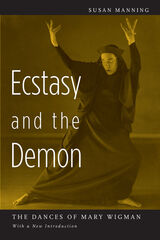 Ecstasy and the Demon: The Dances of Mary Wigman
Susan Manning
University of Minnesota Press, 2006 Mary Wigman, Germany’s premier dancer between the two world wars, envisioned the performer in the thrall of ecstatic and demonic forces. Widely hailed as an innovator of dance modernism, she never acknowledged her complex relationship with National Socialism. In Ecstasy and the Demon, Susan Manning advances a sociological explanation for the collaboration between German modern dancers and National Socialism. She models methods for dance studies that contextualize choreography in relation to changing sociopolitical conditions, bringing dance scholarship into conversation with intellectual trends across the humanities.The introduction to this second edition brings Manning’s groundbreaking work to bear on dance studies today and reconsiders Wigman’s career from the perspective of queer theory and globalization, further illuminating the interplay of dance and politics in the twentieth century.Susan Manning is professor of English, theater, and performance studies at Northwestern University.
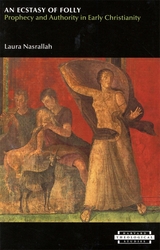 An Ecstasy of Folly: Prophecy and Authority in Early Christianity
Laura Nasrallah
Harvard University Press, 2003 Who is a true prophet? Who has real access to divine realms of knowledge? Early Christian communities accused each other’s prophets of madness and of making false claims to divine knowledge. This book argues that early Christians did not seek to answer questions about true prophecy or to define madness and rationality, but rather used this discourse in order to control knowledge, to establish their own authority, and to define Christian identity. Christians launched these arguments in the context of the Greco-Roman world, where prophecy, visions, ecstasy, and dreams—all considered part of the same phenomenon—were the subject of cutting-edge philosophical, medical, and even political debates.
Early Christian prophecy has usually been interpreted according to a model which explains that at its origins, Christianity was characterized by vibrant spiritual gifts which declined as church order and institutions developed. Arguing that a model of struggle informed by feminist theory and postcolonial criticism provides a better framework for understanding early Christian texts, this work clarifies how early Christian arguments about rationality, madness, and the role of spiritual gifts in history are attempts to negotiate authority and to define religious identity in the midst of many competing forms of Christianity. Laura Nasrallah uses New Testament and early third-century texts to trace the rhetoric of this debate—rhetoric that is still alive today as communities across the globe struggle to define religious identity.
Ecstasy of Regret: Poems
Dannye Powell
University of Arkansas Press, 2002 Dannye Romine Powell writes of marriage, parenthood, and temptation-of love in its many forms. Her lyrical, imagistic poems bring into sudden focus the subtle shifts of understanding and emotion within intimacy. In her reworking of the primal story of Eve and Adam and throughout all the poems, she elucidates how everyday life can sustain a family or sunder it. With clarity and care, she illuminates the world.
 Ecstatic Émigré: An Ethics of Practice
Claudia Keelan
University of Michigan Press, 2018 Most think of an émigré as one who leaves her native land to find home in another. Claudia Keelan, in essays both personal and critical, enlists poetic company for her journey, engaging both canonical and common figures, from Gertrude Stein to a prophetic Las Vegas cab driver named Caesar. Mapping her own peripatetic evolution in poetry and her nomadic life, she also engages with Christian and Buddhist doctrines on the virtues of dispossession.
Ecstatic Émigré pays homage to poets from Thoreau and Whitman to Alice Notley, all of whom share a commitment to living and writing in the moment. Keelan asks the same questions about the growth of flowers or the meaning of bioluminescence as she does about the poetics of John Cage or George Oppen. Her originality is grounded by the ways in which she connects poetic principles with the spiritual concepts of via negativa demonstrated both in St. John of the Cross and Mahayana Buddhism. In addition, her essays demonstrate an activist spirit and share a commitment to the passive resistance demonstrated in Martin Luther King, Jr.’s concept of the “beloved community” and philosopher Simone Weil’s dedication to “exile.”
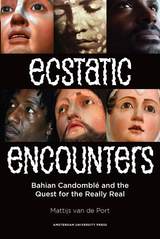 Ecstatic Encounters: Bahian Candomblé and the Quest for the Really Real
Mattijs van de Port
Amsterdam University Press, 2011 For over a hundred years, writers, artists, anthropologists and tourists have travelled to Bahia, Brazil, in search of the spirit possession cult called Candomblé. Thus, successive generations of cultists have seen a long, steady stream of curious outsiders coming to their temples with notebooks and cameras, questions and inquisitive gazes, or ogling eyes and the hope of inclusion. This study asks what seduced these outsiders to seek access to the Afro-Brazilian religious universe and, conversely, how did cultists respond to the overwhelming interest in their creed and to becoming an object of the outsiders’ imaginations.
“Thriving in the gap between the sensuous fullness of life and the impossibility of its cultural representation, Ecstatic Encounters opens mind-blowing vistas for 'writing culture' in anthropology today.”— Birgit Meyer, Free University of Amsterdam.
Ecuador: A Travel Journal
Henri Michaux
Northwestern University Press, 2001 Poet Henri Michaux boarded a ship for Ecuador in 1927 as "a man who knows neither how to travel nor how to keep a journal." The result is a work of pointed observation and sensual, even hallucinogenic, poetry and prose.
 The Ecuador Reader: History, Culture, Politics
Carlos de la Torre and Steve Striffler, eds.
Duke University Press, 2008 Encompassing Amazonian rainforests, Andean peaks, coastal lowlands, and the Galápagos Islands, Ecuador’s geography is notably diverse. So too are its history, culture, and politics, all of which are examined from many perspectives in The Ecuador Reader. Spanning the years before the arrival of the Spanish in the early 1500s to the present, this rich anthology addresses colonialism, independence, the nation’s integration into the world economy, and its tumultuous twentieth century. Interspersed among forty-eight written selections are more than three dozen images. The voices and creations of Ecuadorian politicians, writers, artists, scholars, activists, and journalists fill the Reader, from José María Velasco Ibarra, the nation’s ultimate populist and five-time president, to Pancho Jaime, a political satirist; from Julio Jaramillo, a popular twentieth-century singer, to anonymous indigenous women artists who produced ceramics in the 1500s; and from the poems of Afro-Ecuadorians, to the fiction of the vanguardist Pablo Palacio, to a recipe for traditional Quiteño-style shrimp. The Reader includes an interview with Nina Pacari, the first indigenous woman elected to Ecuador’s national assembly, and a reflection on how to balance tourism with the protection of the Galápagos Islands’ magnificent ecosystem. Complementing selections by Ecuadorians, many never published in English, are samples of some of the best writing on Ecuador by outsiders, including an account of how an indigenous group with non-Inca origins came to see themselves as definitively Incan, an exploration of the fascination with the Andes from the 1700s to the present, chronicles of the less-than-exemplary behavior of U.S. corporations in Ecuador, an examination of Ecuadorians’ overseas migration, and a look at the controversy surrounding the selection of the first black Miss Ecuador.
 Ecumenical Dialogue at Harvard: The Roman Catholic–Protestant Colloquium
Samuel H. Miller
Harvard University Press One hundred and sixty invited scholars and specialists—both Protestant and Roman Catholic—and 2000 other clergy and lay people took part in the historic colloquium sponsored by the Harvard Divinity School in 1963 as a Protestant response to the Second Vatican Council. This volume includes the Stillman Lectures on the Unity of Christians given by Augustin Cardinal Bea, President of the Vatican Secretariat for Promoting Christian Unity as well as all the other major addresses and proceedings of the colloquium.
In the words of Richard Cardinal Cushing, “The spirit of Christian love which could be felt in every session, along with the distinguished company of scholars which the University had assembled from far and near, guaranteed that these days would be so memorable as to demand an accessible and enduring record. We now have just such a record in these pages.” Encompassing a wide range of religious convictions, this topical and exciting book provides an illuminating perspective on the problems involved in the ecumenical dialogue and helps to define the vital issues that continue to divide Christians today.
Ecumenical Jihad: Ecumenism and the Culture War
Peter Kreeft
St. Augustine's Press, 2015 Juxtaposing “ecumenism” and “jihad,” two words that many would consider strange and at odds with one another, Peter Kreeft argues that we need to change our current categories and alignments. We need to realize that we are at war and that the sides have changed radically. Documenting the spiritual and moral decay that has taken hold of modern society, Kreeft issues a wake-up call to all God-fearing Christians, Jews, and Muslims to unite together in a “religious war” against the common enemy of godless secular humanism, materialism, and immorality.
Aware of the deep theological differences of these monotheistic faiths, Kreeft calls for a moratorium on our polemics against one another so that we can form an alliance to fight together to save Western civilization.
 Ecumenism in the Age of the Reformation: The Colloquy of Poissy
Donald Nugent
Harvard University Press, 1974 Contemporary ecumenism is a revival of a Reformation ideal. The Colloquy of Poissy was the last great expression expression of that ideal. At the colloquy, held in 1561 on the eve of the French religious wars, revived Catholicism and emergent international Protestantism met in an attempt to establish peace, unity, and reconciliation of differing viewpoints. A history of this great conference reveals how unfinished was the Reformation and how tragic a turn it had taken.
This work on the colloquy presents the dialectical complexities of the sixteenth-century theology—a theology that had emerged with binding strands of religious idealism and political interest. Theology was, indeed, the medium of discourse, but it was not an end in itself. Rather, it was a means to a higher goal: religious reconciliation.
The present analysis, therefore, is not so much a study in the abstractions of theology as it is a study in ecumenism. Poissy is placed in a larger historical background and the author carefully and critically weighs all factors which affected the chances for religious unity. Within this larger context, he argues that the colloquy placed the participants at the final crossroads of the Reformation. When it was over the Reformation was sealed and the Counter-Reformation signaled.
Donald Nugent’s approach is revisionist; his theological orientation is Erasmian, ecumenical, and speculative. He shows that ecumenism has been effectively and banefully excised from historiography and argues that it must be reintegrated into the story of the Reformation. Because we live in a new age of ecumenism, the author’s insights and conclusions are especially appropriate. We have now that keen and historical dimension which cannot but help illuminate contemporary life.
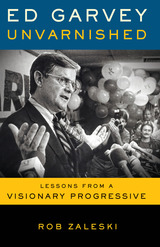 Ed Garvey Unvarnished: Lessons from a Visionary Progressive
Rob Zaleski
University of Wisconsin Press, 2019 Ed Garvey (1940–2017) was one of the most influential and colorful progressive politicians in Wisconsin's history. Growing up in what was a conservative rural town, he got his first taste of liberal activism at the University of Wisconsin in the 1960s, became the first executive director of the National Football League Players' Union, led two spirited campaigns against Bob Kasten and Tommy Thompson, and eventually cofounded the Fighting Bob Fest.
Shortly before he died, Garvey expressed his views on everything in a series of detailed, no-holds-barred interviews with journalist Rob Zaleski. In his trademark witty, blunt, and often abrasive style, he offered his impressions of the political climate, worries about the environment, and Act 10 protests on Capitol Square. Garvey's candor during these conversations provides deeper insight into the personal highs and lows he experienced over his rich life. Diehard followers will fondly remember his energetic campaigns, but they may be surprised to learn of his long-simmering disappointment after those losses. Ever timely and meaningful, Garvey's words offer a path for how the Democratic Party, both within Wisconsin and nationally, can regain its soul.
 Ed Ruscha's Streets of Los Angeles: Artist, Image, Archive, City
Andrew Perchuk
J. Paul Getty Trust, The, 2025 Through analysis of Ed Ruscha’s visionary Streets of Los Angeles Archive, this volume provides new understandings of his artistic practice, the history of L.A., and the innovative role of technology in the archive.
In 1966, Ed Ruscha drove a car rigged with a motorized camera to capture Los Angeles’ most iconic street: Sunset Boulevard. He created a time capsule of its famed facades, beginning a sixty-year-long commitment to documenting the changing urban landscape of postwar Los Angeles. The Streets of Los Angeles project that comprises these photographs is likely the most comprehensive artistic record of any city, with over 900,000 images of major thoroughfares. Ruscha’s photographs constitute an unparalleled visual chronicle of both iconic and everyday sites in L.A., including popular music venues, neighborhood restaurants, and billboards promoting Hollywood’s latest blockbusters.
In this volume, scholars from disciplines such as urban planning, cultural geography, architecture, art history, and musicology explore the Streets of Los Angeles Archive as a rich repository for analyzing Ruscha’s practice and the city’s visual culture. Using his photographs and new data visualizations, the authors consider what it means to interpret an archive mostly accessible through digital technologies, and they demonstrate how histories of art have been indelibly reshaped since the advent of the information age in the 1960s.
This publication was created using Quire™, a multiformat publishing tool from Getty. The free online edition of this open-access publication is available at www.getty.edu/publications/ruscha/ and includes video, data visualizations, and zoomable illustrations. Free PDF and EPUB downloads of the book are also available.
Ed School: A Brief for Professional Education
Geraldine Jonçich Clifford and James W. Guthrie
University of Chicago Press, 1988 Although schools of law, medicine, and business are now highly respected, schools of education and the professionals they produce continue to be held in low regard. In Ed School, Geraldine Jonçich Clifford and James W. Guthrie attribute this phenomenon to issues of academic politics and gender bias as they trace the origins and development of the school of education in the United States.
Drawing on case studies of leading schools of education, the authors offer a bold, controversial agenda for reform: ed schools must reorient themselves toward teachers and away from the quest for prestige in academe; they must also adhere to national professional standards, abandon the undergraduate education major, and reject the Ph.D. in education in favor of the Ed.D.
EDCC vol 61 num 2
The University of Chicago Press
University of Chicago Press Journals, 2013
EDCC vol 61 num 3
The University of Chicago Press
University of Chicago Press Journals, 2013
EDCC vol 61 num 4
The University of Chicago Press
University of Chicago Press Journals, 2013
EDCC vol 62 num 1
The University of Chicago Press
University of Chicago Press Journals, 2013
EDCC vol 62 num 2
The University of Chicago Press
University of Chicago Press Journals, 2014
EDCC vol 62 num 3
The University of Chicago Press
University of Chicago Press Journals, 2014
EDCC vol 62 num 4
The University of Chicago Press
University of Chicago Press Journals, 2014
EDCC vol 63 num 1
The University of Chicago Press
University of Chicago Press Journals, 2014
EDCC vol 63 num 2
The University of Chicago Press
University of Chicago Press Journals, 2015
EDCC vol 63 num 3
The University of Chicago Press
University of Chicago Press Journals, 2015
EDCC vol 63 num 4
The University of Chicago Press
University of Chicago Press Journals, 2015
EDCC vol 64 num 1
The University of Chicago Press
University of Chicago Press Journals, 2015
EDCC vol 64 num 2
The University of Chicago Press
University of Chicago Press Journals, 2016
EDCC vol 64 num 3
The University of Chicago Press
University of Chicago Press Journals, 2016
EDCC vol 64 num 4
The University of Chicago Press
University of Chicago Press Journals, 2016
EDCC vol 65 num 1
The University of Chicago Press
University of Chicago Press Journals, 2016
EDCC vol 65 num 2
The University of Chicago Press
University of Chicago Press Journals, 2017
EDCC vol 65 num 3
The University of Chicago Press
University of Chicago Press Journals, 2017
EDCC vol 65 num 4
The University of Chicago Press
University of Chicago Press Journals, 2017
EDCC vol 66 num 1
The University of Chicago Press
University of Chicago Press Journals, 2017
EDCC vol 66 num 2
The University of Chicago Press
University of Chicago Press Journals, 2018
EDCC vol 66 num 3
The University of Chicago Press
University of Chicago Press Journals, 2018
EDCC vol 66 num 4
The University of Chicago Press
University of Chicago Press Journals, 2018
EDCC vol 67 num 1
The University of Chicago Press
University of Chicago Press Journals, 2018
EDCC vol 67 num 2
The University of Chicago Press
University of Chicago Press Journals, 2019
EDCC vol 67 num 3
The University of Chicago Press
University of Chicago Press Journals, 2019
EDCC vol 67 num 4
The University of Chicago Press
University of Chicago Press Journals, 2019
EDCC vol 68 num 1
The University of Chicago Press
University of Chicago Press Journals, 2019
EDCC vol 68 num 2
The University of Chicago Press
University of Chicago Press Journals, 2020
EDCC vol 68 num 3
The University of Chicago Press
University of Chicago Press Journals, 2020
EDCC vol 68 num 4
The University of Chicago Press
University of Chicago Press Journals, 2020
EDCC vol 69 num 1
The University of Chicago Press
University of Chicago Press Journals, 2020
EDCC vol 69 num 2
The University of Chicago Press
University of Chicago Press Journals, 2021
The Edda: A Collection of Essays
R.J. Glendinning
University of Manitoba Press, 1983 Twelve essays are presented by outstanding authorities in Nordic medieval studies and range from treatment of broad aspects of the Edda, to consideration of single poems, to analysis of parts of specific works. An attactive and important collection for every scholar of Old Scandinavian.
 The Eddie Cantor Story: A Jewish Life in Performance and Politics
David Weinstein
Brandeis University Press, 2017 This absorbing biography chronicles the life and work of one of the most important entertainers of the twentieth century. Eddie Cantor (1892–1964) starred in theater, film, radio, and television. His immense popularity across a variety of media, his pride in his Jewish heritage, and his engagement with pressing political issues distinguished him from other headliners of his era. Paying equal attention to Cantor’s humor and politics, Weinstein documents his significance as a performer, philanthropist, and activist. Many show business figures quietly shed their Jewish backgrounds or did not call attention to the fact that they were Jewish. Cantor was different. He addressed the vital issues of his times, including acculturation, national identity, and antisemitism. He was especially forceful in opposing Nazism and paid a price for this activism in 1939, when a sponsor cancelled the actor’s radio program. In this carefully researched book, Weinstein uncovers sketches and routines filled with Jewish phrases, allusions, jokes, songs, and stories. Cantor frequently did not mark this material as “Jewish,” relying instead on attentive audiences to interpret his coded performances. Illustrated with thirty photographs, The Eddie Cantor Story examines the evolution, impact, and legacy of Cantor’s performance style. His music and comedy not only shaped the history of popular entertainment, but also provide a foundation for ongoing efforts to redefine Jewish culture and build community in contemporary America.
Eden
Peter Wilby
Haus Publishing, 2006 Succeeded Churchill as Prime Minister, but worsened relations with USA during the Suez Crisis
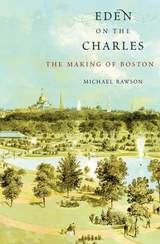 Eden on the Charles: The Making of Boston
Michael Rawson
Harvard University Press, 2014 Drinking a glass of tap water, strolling in a park, hopping a train for the suburbs: some aspects of city life are so familiar that we don’t think twice about them. But such simple actions are structured by complex relationships with our natural world. The contours of these relationships—social, cultural, political, economic, and legal—were established during America’s first great period of urbanization in the nineteenth century, and Boston, one of the earliest cities in America, often led the nation in designing them. A richly textured cultural and social history of the development of nineteenth-century Boston, this book provides a new environmental perspective on the creation of America’s first cities.
Eden on the Charles explores how Bostonians channeled country lakes through miles of pipeline to provide clean water; dredged the ocean to deepen the harbor; filled tidal flats and covered the peninsula with houses, shops, and factories; and created a metropolitan system of parks and greenways, facilitating the conversion of fields into suburbs. The book shows how, in Boston, different class and ethnic groups brought rival ideas of nature and competing visions of a “city upon a hill” to the process of urbanization—and were forced to conform their goals to the realities of Boston’s distinctive natural setting. The outcomes of their battles for control over the city’s development were ultimately recorded in the very fabric of Boston itself. In Boston’s history, we find the seeds of the environmental relationships that—for better or worse—have defined urban America to this day.
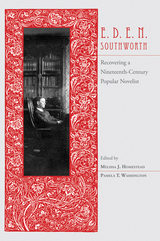 E.D.E.N. Southworth: Recovering a Nineteenth-Century Popular Novelist
Melissa Homestead
University of Tennessee Press, 2012 The prolific nineteenth-century writer E. D. E. N. Southworth enjoyed enormous public success in her day—she published nearly fifty novels during her career—but that very popularity, combined with her gender, led to her almost complete neglect by the critical establishment before the emergence of academic feminism. Even now, most scholarship on Southworth focuses on her most famous novel, The Hidden Hand. However, this new book—the first since the 1930s devoted entirely to Southworth—shows the depth of her career beyond that publication and reassesses her place in American literature.
Editors Melissa Homestead and Pamela Washington have gathered twelve original essays from both established and emerging scholars that set a new agenda for the study of E. D. E. N. Southworth’s works. Following an introduction by the editors, these articles are divided into four thematic clusters. The first, “Serial Southworth,” treats her fiction in periodical publication contexts. “Southworth’s Genres,” the second grouping, considers her use of a range of genres beyond the sentimental novel and the domestic novel. In the third part, “Intertextual Southworth,” the essays present intensive case studies of Southworth’s engagement with literary traditions such as Greek and Restoration drama and with her contemporaries such as Harriet Beecher Stowe and French novelist George Sand. Southworth’s focus on social issues and reform figures prominently throughout the volume, but the pieces in the fourth section, “Southworth, Marriage, and the Law,” present a sustained inquiry into the ways in which marriage law and the status of women in the nineteenth century engaged her literary imagination.
The collection concludes with the first chronological bibliography of Southworth’s fiction organized by serialization date rather than book publication. For the first time, scholars will be able to trace the publication history of each novel and will be able to access citations for lesser-known and previously unknown works.
With its fresh approach, this volume will be of great value to students and scholars of American literature, women’s studies, and popular culture studies.
MELISSA J. HOMESTEAD is the Susan J. Rosowski Associate Professor of English at the University of Nebraska–Lincoln. Her book American Women Authors and Literary Property, 1822–1869 includes Southworth, and her articles on American women’s writing have been published in a variety of academic journals.
PAMELA T. WASHINGTON is Professor of English and former dean of the College of Liberal Arts at the University of Central Oklahoma. She is the co-author of Fresh Takes: Explorations in Reading and Writing: A Freshman Composition Text.
Eden-Brazil
Moacyr Scliar, Translated by Malcolm K. McNee
Tagus Press, 2019 Adamastor is a freshly divorced, frustrated bureaucrat trying to reinvent his life. Richie is a young, struggling actor. Together with Ernesto, a rakish, expat Argentine showman, they create Eden-Brazil, an ecotourism destination in a stunning swath of coastal rainforest. Inspired to provide visitors with the ultimate return to nature, they decide to stage the biblical story of the Garden of Eden, complete with Adam, Eve, snake, apple, the works. But recreating an earthly paradise as something more than another roadside attraction is no easy feat. In this charming, tragicomic tale, Moacyr Scliar employs his signature humor and talent for crisp storytelling, weaving together a playfully serious parable of environmentalist ideals clashing with the realities of local politics, global consumer culture, and competing visions of authentic nature., reviewing a previous edition or volume
|
|



